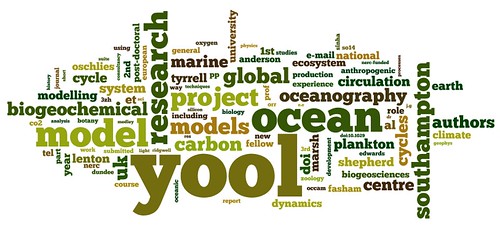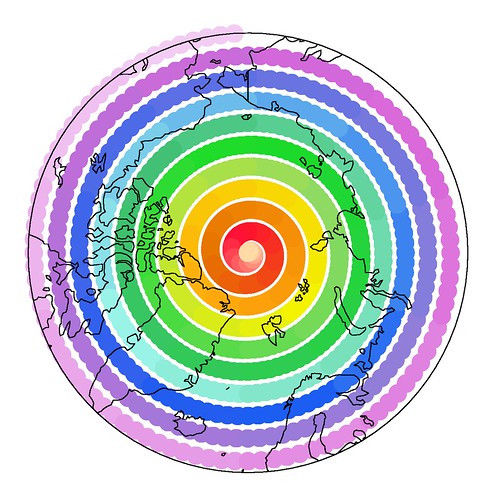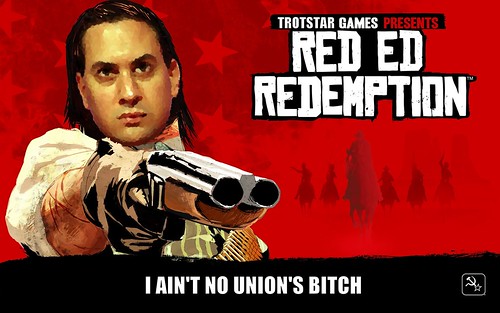Friday 24 December 2010
A great start
After a much delayed journey pole-wards yesterday to Scotland for Christmas (planes and trains), I then put the icing on the cake by slipping on ice almost immediately after arriving at Dundee train station. The upshot of which is that I'm "enjoying" my annual, week-long pilgrimage to the ancestoral home with a twisted (right) ankle. Excellent. Actually, if it were anyone other than me, I'm sure that I'd have found the irony of it pretty funny. Arse.
Sunday 19 December 2010
Coriander Lounge
Partly because C's family were visiting, partly because it was my birthday, and partly just to get back on that horse, we went out last night to the same restaurant I had an adventure in last month. No repeat visits to the A&E this time, but it confirmed that it was a great place to eat. I was also alarmed to notice just how heavy the door I fell through is. No wonder I'm (ever so slightly) scarred for life.
Scandanavian Rebus
While Inspector Rebus has, to put it mildly, had something of mixed success in his translation to television (cf. John Hannah's woeful miscasting), the screen (big and small) has been much more kind to Sweden's Inspector Wallander, of whom there are already three distinct incarnations (including a recent UK production with Kenneth Branagh in the lead role). Having enjoyed these, and reasoning that film and TV producers only back sure things, I gave the biggest Rebus fan I know (C) the first of Henning Mankell's Wallander novels, Faceless Killers, as a present. So, how fares the crime genre across the North Sea?
The novel opens on a cold winter night with an elderly farmer, alerted by disconcerting calls for help, discovering a horrifying scene in the farmhouse of his old friends and neighbours. Expecting a routine, rural call-out, the middle-aged Inspector Wallander arrives to find a dead husband and his nearly lifeless wife, both victims of a brutal assault and torture. The motive for the crime is unknown, but the investigation gets its only divisive clue in the dying words of the wife, "Foreign". Leaked to the press by a junior officer, this information adds fuel to the simmering hate of Sweden's Far Right groups. As well as struggling to understand the initial murders, Wallander now has to contend with an attack on a refugee encampment, and a further racially-motivated murder of a Somali refugee. His investigation of the former crime leads him to uncover uncomfortable facts about the murdered farmer, while the latter crime draws in murky connections between a police officer and racists. And all the while Wallander has his personal demons to contend with: a failed marriage; an estranged daughter; and his elderly artist father, dismissive of his choice of career.
Much like the Rebus novels, this is solidly enjoyable genre fare. It has all the right ingredients, mixing in a perplexing initial mystery, a number of tantalising if ultimately unhelpful leads, victims that are not quite what they first seem, and a solution that reads like an entirely plausible fusion of Wallander's luck and skill. I particularly liked the fact that the investigation unfurled at a realistic pace; normally, fictional crimes are solved frenetically within days, but here the pieces take time to fall into place. The novel also does an convincing job with Wallander himself, quickly and economically establishing where he is in life, and deftly filling in his, and his family's, history. While Rebus has some rough edges, Wallander has quite a number more, and his creation as a borderline unlikeable character, with both talents and flaws, is handled well. Of course, it also helps that it's been translated with what seems a lot more care than another, much more famous, Swedish novel that I've recently read.
Comparing with Rebus is quite instructive. As another first detective novel in a long series, I think Wallander gets off to a much better start than Rebus. The latter's first outing (read pre-blog) was a rather clichéd start that, for me at least, made the cardinal error of moving Rebus from the role of investigator to that of the key to the mystery. To be fair to Rankin, when he first wrote Rebus, this plotline was probably less of a cliché than endless detective TV dramas have now made it appear. But in Faceless Killers, Mankell also gifts Wallander with a much more realistic-seeming backstory than Rebus' SAS background (and then foreground) from Knots and Crosses. This, however, also serves to make him quite a bit less sympathetic, but, straight out the box, he seems a much more three dimensional character than his Edinburgh rival did. That journey took Rebus a few more novels, but he seems to very much have gotten there from my last visit.
One minor complaint I did have with Faceless Killers is how its dénouement relies on a character with a somewhat implausibly good memory. The original murders are long cold, but a bank teller is able to pass along some key information. In Branagh's TV series, this was more plausibly (and cleverly) handled via security videos, but here it strains credulity a bit. Not seriously, but Mankell could have thought a little bit more about this critical development.
Anyway, a very good start to a series that I've certainly enjoyed on television. I suspect I'll be back here at some point before too long.
The novel opens on a cold winter night with an elderly farmer, alerted by disconcerting calls for help, discovering a horrifying scene in the farmhouse of his old friends and neighbours. Expecting a routine, rural call-out, the middle-aged Inspector Wallander arrives to find a dead husband and his nearly lifeless wife, both victims of a brutal assault and torture. The motive for the crime is unknown, but the investigation gets its only divisive clue in the dying words of the wife, "Foreign". Leaked to the press by a junior officer, this information adds fuel to the simmering hate of Sweden's Far Right groups. As well as struggling to understand the initial murders, Wallander now has to contend with an attack on a refugee encampment, and a further racially-motivated murder of a Somali refugee. His investigation of the former crime leads him to uncover uncomfortable facts about the murdered farmer, while the latter crime draws in murky connections between a police officer and racists. And all the while Wallander has his personal demons to contend with: a failed marriage; an estranged daughter; and his elderly artist father, dismissive of his choice of career.
Much like the Rebus novels, this is solidly enjoyable genre fare. It has all the right ingredients, mixing in a perplexing initial mystery, a number of tantalising if ultimately unhelpful leads, victims that are not quite what they first seem, and a solution that reads like an entirely plausible fusion of Wallander's luck and skill. I particularly liked the fact that the investigation unfurled at a realistic pace; normally, fictional crimes are solved frenetically within days, but here the pieces take time to fall into place. The novel also does an convincing job with Wallander himself, quickly and economically establishing where he is in life, and deftly filling in his, and his family's, history. While Rebus has some rough edges, Wallander has quite a number more, and his creation as a borderline unlikeable character, with both talents and flaws, is handled well. Of course, it also helps that it's been translated with what seems a lot more care than another, much more famous, Swedish novel that I've recently read.
Comparing with Rebus is quite instructive. As another first detective novel in a long series, I think Wallander gets off to a much better start than Rebus. The latter's first outing (read pre-blog) was a rather clichéd start that, for me at least, made the cardinal error of moving Rebus from the role of investigator to that of the key to the mystery. To be fair to Rankin, when he first wrote Rebus, this plotline was probably less of a cliché than endless detective TV dramas have now made it appear. But in Faceless Killers, Mankell also gifts Wallander with a much more realistic-seeming backstory than Rebus' SAS background (and then foreground) from Knots and Crosses. This, however, also serves to make him quite a bit less sympathetic, but, straight out the box, he seems a much more three dimensional character than his Edinburgh rival did. That journey took Rebus a few more novels, but he seems to very much have gotten there from my last visit.
One minor complaint I did have with Faceless Killers is how its dénouement relies on a character with a somewhat implausibly good memory. The original murders are long cold, but a bank teller is able to pass along some key information. In Branagh's TV series, this was more plausibly (and cleverly) handled via security videos, but here it strains credulity a bit. Not seriously, but Mankell could have thought a little bit more about this critical development.
Anyway, a very good start to a series that I've certainly enjoyed on television. I suspect I'll be back here at some point before too long.
Friday 17 December 2010
NOCS Christmas Quiz
Another Christmas tradition today: the NOCS Christmas Quiz. One that our team came oh-so-close to winning several years ago, but were defeated at the end on account of a misplayed (by me) points-doubling joker. To be fair, the jokers were blind, but if I'd played them on any round other than the one I did, we'd have won.
Anyway, drawing a veil over this catastrophe, how did we do today? In summary, we still didn't win, but our defeat wasn't quite so tainted by a gutting near miss. That said, going into the last round, we were placed joint first, but an excellent performance by one of our rivals on what was by far our worst round saw them justly take victory. As it happens we came joint second, but weathered a tie-break in which our answer was judged "more correct" than that of another rival (thanks to SXJ's knowledge of Halley's Comet visits). Our answers and score card can be seen below.
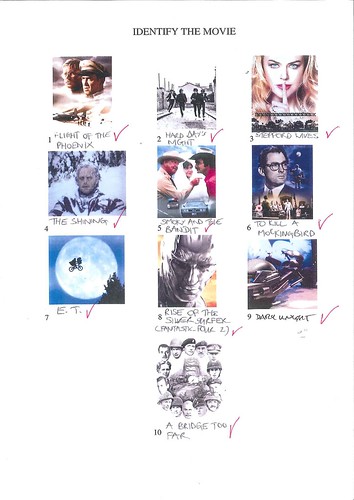
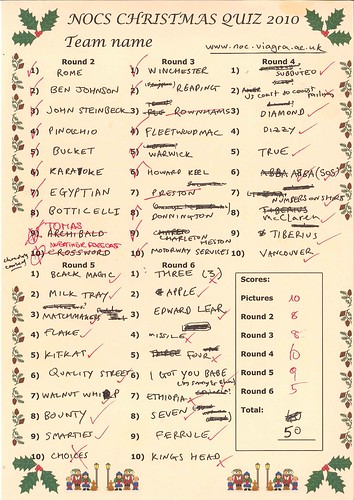
There's always next year ...
Anyway, drawing a veil over this catastrophe, how did we do today? In summary, we still didn't win, but our defeat wasn't quite so tainted by a gutting near miss. That said, going into the last round, we were placed joint first, but an excellent performance by one of our rivals on what was by far our worst round saw them justly take victory. As it happens we came joint second, but weathered a tie-break in which our answer was judged "more correct" than that of another rival (thanks to SXJ's knowledge of Halley's Comet visits). Our answers and score card can be seen below.


There's always next year ...
Thursday 16 December 2010
Free will reprise
It's Christmas again. And among the regular festive highlights is our annual Biomodellers Christmas Lunch, a tradition that got off to a start in 2003. Anyway, it's normal at these events for alcohol-fuelled discussion to take a turn for the philosophical, and a regular topic for myself, APM and BS is that of (so-called) free will. By way of (biased) summary: they say "illusion"; I say "real, but I can be persuaded otherwise". Anyway, unless I'm bone-headedly mistaken, we're still in the phase of taking pot-shots at one another's ideas. However, one of the problems with our discussion is that it flares up only once or twice a year, such that the meat of it becomes attenuated and forgotten between skirmishes. To get around this, I present here some summary points to facilitate the return to (slightly) drunken hostilities next week.
- Stepping back from free will per se, the subjective component of consciousness itself remains singularly unexplained by current empirical science; what, for instance, is my subjectivity made from or projected onto? matter and energy alone don't obviously provide a substrate from which to weave it, at least as we currently understand them; this is, of course, as much a problem for me as for APM and BS, though I would claim it as evidence of "hidden variables"
- If subjective experience is simply a one-way phenomenon that is a functionally unnecessary bi-product of physico-chemical processes in our heads (i.e. akin to a real-time graph of the output of an underway computer simulation), then:
- why is it so well-realised and coherent? (i.e. why not just a jumble of subjective phenomena);
- why does it include features such as emotions that appear designed to channel behaviour in particular ways? (i.e. why is this necessary if things are one-way);
- why does it include an overwhelming and well-developed sense of being "in control"? (i.e. what possible process can this sensation be an emergent property of)
- To try to tease BS's chain of thought out some more, regardless of whether one judges quantum systems as stochastic or cryptically deterministic (= "hidden variables"), if one subscribes to the "illusion" school of thought (ISOT), conscious decisions are either the necessary outcomes of a chain of molecular events, or random (with a dose of determinism) outcomes of the same; does this in any way square with the subjective experience of decision-making?
- Just to avoid any accusations of dualism (or, heaven forfend, mysticism), whatever it is I'm looking for, I expect it to be subject to physical investigation; I don't believe that this is currently true, since I'm arguing for "hidden variables", but I believe that one day this will come to pass
Tuesday 14 December 2010
Rebus 5
After a detour into decidedly dodgy science fiction, I thought I'd get back onto more solidly reliable genre fare with Ian Rankin's Rebus number 5 novel, The Black Book.
I actually read this a month or so back, so can't actually remember all of the various ins and outs of the plot. Suffice to say that it was a satisfyingly twisty tale that dragged in present and past murders, a suspicious hotel fire, an attack on one of Rebus' closest colleagues, and the unveiling of Big Ger, an Edinburgh kingpin darkly hinted at in earlier novels. It also skilfully balanced these crime strands with the re-appearance of Rebus' brother, Michael, from prison and his on-again-off-again relationship with his doctor girlfriend, the appropriately-named Patience.
What was particularly pleasing about this book was that it really felt like Rankin has finally hit his stride with Rebus. With great economy of narrative and character, Rankin spins out his tale, and almost effortlessly reels in the reader. By this point in the series of novels, Rebus' character, and the world that he operates within, feels satisfyingly lived-in, like a comfortable pair of slippers. Previous books have been a lot less sure-footed, and Rankin has had to take the reader by the hand more, but here things flow much more easily - perhaps just because Rankin's world-building is more complete.
Twelve novels to go.
I actually read this a month or so back, so can't actually remember all of the various ins and outs of the plot. Suffice to say that it was a satisfyingly twisty tale that dragged in present and past murders, a suspicious hotel fire, an attack on one of Rebus' closest colleagues, and the unveiling of Big Ger, an Edinburgh kingpin darkly hinted at in earlier novels. It also skilfully balanced these crime strands with the re-appearance of Rebus' brother, Michael, from prison and his on-again-off-again relationship with his doctor girlfriend, the appropriately-named Patience.
What was particularly pleasing about this book was that it really felt like Rankin has finally hit his stride with Rebus. With great economy of narrative and character, Rankin spins out his tale, and almost effortlessly reels in the reader. By this point in the series of novels, Rebus' character, and the world that he operates within, feels satisfyingly lived-in, like a comfortable pair of slippers. Previous books have been a lot less sure-footed, and Rankin has had to take the reader by the hand more, but here things flow much more easily - perhaps just because Rankin's world-building is more complete.
Twelve novels to go.
Saturday 11 December 2010
Venusian morning
While up early today collecting Christmas presents that needed signing for from our "local" post depot, I spotted a particularly bright Morning Star ...

One tripod later, and I knocked up a time-lapse of its rise, then washout, against the backdrop of that of the sun ...
According to the astronomy app we use, Saturn is currently just a little further along the ecliptic than Venus, but there was no sign of it this morning. It's possibly just a little too faint to be seen against sunrise.

One tripod later, and I knocked up a time-lapse of its rise, then washout, against the backdrop of that of the sun ...
According to the astronomy app we use, Saturn is currently just a little further along the ecliptic than Venus, but there was no sign of it this morning. It's possibly just a little too faint to be seen against sunrise.
Friday 10 December 2010
QUIP summary
One of the many sections of the electronic Je-S grant form that I had to complete earlier this week was one that summarises the work (4000 characters or less) for a non-specialist audience. This is ostensibly for non-scientists, but I have a sneaking suspicion that it's also the first point-of-entry for NERC administrators. Anyway, below is what I wrote for QUIP ...
Although climate change is happening all over the world, its effects are not spread evenly, and one area which is particularly strongly affected is the Arctic. Here, intrinsic aspects of its local climate, together with a series of positive feedback loops (where some warming causes more warming which cause even more warming ...), act to give the Arctic some of the most extreme change observed to date. A key factor in this is the amount of sea-ice that covers the Arctic Ocean. By reflecting light back into space, sea-ice plays a critical role in Arctic climate, but it has been declining year on year as the Earth warms, and experienced a record low in the summer of 2007. As well as influencing climate, the sea-ice also controls the distributions of photosynthesis and plankton, and through these is believed to play an important role in the carbon cycle of the Arctic Ocean.Incidentally, I am officially not interested in hearing about typos or bad grammar in the above. It's gone to NERC now - I can't do anything about it.
Although we expect the Arctic sea-ice to continue to decline in the coming decades, the rate at which this will happen is uncertain. Some of this uncertainty is the result of limitations in our understanding of physical phenomena, while some stems from our uncertainty about future greenhouse gas emissions by human civilisation. To help resolve the consequences of this uncertainty, climate modellers routinely run multiple simulations to explore possible futures. However, understanding the fate of Arctic biological systems is less straightforward, since our models of these are complex and make simulations of the future considerably more time-consuming and expensive to perform. As a result, much of the work that peers into the future looks only at the Earth's climate and ignores changes to natural ecosystems.
To try to get around this limitation, the work proposed here in QUIP sets out to use a simplified model of the Arctic's plankton ecosystem (parameterised using some of our recent work at NOC) in conjunction with output from existing future climate simulations. In this way it will assess the future of Arctic biology without the need for expensive additional simulations, and will exploit a large range of already existing climate simulations to quantify both what may happen to ecosystems in the future, and their sensitivity to emissions scenarios and other uncertainties in our climate models.
Thursday 9 December 2010
Pointless violence
Another day, another anti-fees riot in London. And another slew of politicians fatuously chiding that while peaceful protest is acceptable, violent protest is an outrage. Of course, I agree with them, violent protests against the actions of the government all but never have any impact on the relevant politicians or institutions. Instead, they damage public property, disrupt the lives of otherwise uninvolved people and generally discredit the rationale for the protest.
But at the same time I suspect that, behind their polished platitudes about the centrality of peaceful protest in democracies, politicians are smugly aware that peaceful protests accomplish precisely nothing. The 2003 protests in London against the incipient Iraq War managed to attract 2 million people, but that didn't even give politicians a moments pause in their rush to start a war under false pretences. And if that many people marching against such a fatuous misuse of government power can't change anything, what hope for a smaller number of students campaigning against tripling of university fees?
No, for all my distaste for violent protest, I can't quell the thought that the only time I remember a protest accomplishing something was during the decidedly non-peaceful Poll Tax Riots of 1990. I don't think the riots then did all the work, they were just the focus of a popular swell of opposition to the government, but they were definitely instrumental in the subsequent dismantling of the Poll Tax (or, at least, that's my recollection). No, I suspect that politicians, whether they say it or not, like peaceful protests because they like pointless protests that they can nod sagely about and then entirely ignore.
But at the same time I suspect that, behind their polished platitudes about the centrality of peaceful protest in democracies, politicians are smugly aware that peaceful protests accomplish precisely nothing. The 2003 protests in London against the incipient Iraq War managed to attract 2 million people, but that didn't even give politicians a moments pause in their rush to start a war under false pretences. And if that many people marching against such a fatuous misuse of government power can't change anything, what hope for a smaller number of students campaigning against tripling of university fees?
No, for all my distaste for violent protest, I can't quell the thought that the only time I remember a protest accomplishing something was during the decidedly non-peaceful Poll Tax Riots of 1990. I don't think the riots then did all the work, they were just the focus of a popular swell of opposition to the government, but they were definitely instrumental in the subsequent dismantling of the Poll Tax (or, at least, that's my recollection). No, I suspect that politicians, whether they say it or not, like peaceful protests because they like pointless protests that they can nod sagely about and then entirely ignore.
Monday 6 December 2010
QUIP
I've spent the last few weeks cobbling together a research proposal called QUIP (Quantifying Uncertainty In arctic Productivity), but today finally fired it off to the tender mercies of our research council. By way of "celebrating" seeing the back of it, here's what my Case for Support looks like when fed through Wordle ...

The original can be seen here.
Anyway, what did I learn this time about the whole application-writing process?

The original can be seen here.
Anyway, what did I learn this time about the whole application-writing process?
- It's never to early to start using Je-S; don't underestimate the importance of morale-boosting green ticks
- Don't wait until the last week before starting the Pathways to Impact
- Check that partners are reading from the same page in good time; don't just assume
- Speak to PR to find out what's possible, and what sort of permissions and contacts are needed
- Circulate a draft of the proposal, even a rough one, well in advance of the closing date
Sunday 5 December 2010
Disaster novel
Reflecting on the books that I've written up here (virtually everything I've read since 2007), I sometimes suspect that I give things the benefit of the doubt too much, since I seem to not dislike anything, and to find good parts in everything I've read. Too polite? Too unwilling to consciously concede that I've wasted many hours on a stinker? Anyway, on this occasion, going the other way has been made very easy for me, since today's book, Ark, is a disaster novel (in more than one sense) by the British science fiction writer Stephen Baxter.
Set in the near-future, the novel takes place amidst an Earth struggling with sea level rise of a degree unimagined by today's climate scientists. Reservoirs of water within the Earth's mantle have been breeched, and the Earth is steadily being swamped by an unceasing rise in seawater that shows no sign of abatement. Confronted by projections of the total loss of land, and straining as civilisation is dissipating in the face of mass migration and dwindling resources, the remnant of the US government takes over an originally clandestine project to allow a small population to escape the Earth aboard a generation ship. The novel follows a handful of characters who become directly or indirectly involved in this effort, some of whom make the journey from the Earth to two neighbouring stars. But along the way their commitment to the project is constantly assailed, and their humanity is eroded in the face of an unprecedented disaster that forces choices that are similarly unprecedented.
Where to start? The novel puts so many feet wrong, it's got to be a centipede. Firstly, in the opening pages it sets itself up some sort of murder mystery, giving the reader a victim, an array of suspects, and an investigator to sort things out. The novel then jumps backwards a number of years to introduce the suspects and how they've got to this position, but despite the passage of many pages barely touches the murder before -when it finally catches back up to the start of the novel- solving it in a flash. A flash of "who cares?" by this point, as it happens. This initial wrong-footing sets the novel up nicely for a litany of disappointments.
Another great misstep is how Baxter handles the technological innovation that allows the interstellar journey that makes up a big chunk of the book. After much angst among (cardboard) characters about how infeasible such a voyage is, one character makes a fatuous observation about FTL travel that makes almost no sense (something about spacetime "bubbles"?), only for another "genius" character to pick it up and, again in a flash, suddenly come up with a barely explained solution. The absurdity of Baxter's writing here is revealed in all its glory when, in devising a method for getting the spaceship off Earth, he resorts to a lengthy exposition of a technology that really has been investigated, Project Orion. Cue much shoe-horning in of author research - on a subject that actually is genuinely interesting. Coming from an author venerated for "hard science fiction", this glossing over of a core aspect seems plain lazy.
The biggest crimes committed by Baxter lie with the characters that populate the novel. For one, they're largely the implausibly over-qualified scientist-leaders that have despoiled lesser science fiction novels for decades (cf. Ender's Game). And as the novel progresses they become both progressively more implausible while simultaneously less and less likeable. In part, taking the premise of the novel seriously for a moment, this is to be expected given the situation that they're thrown into, one could possibly even make the case that it's realistic. But the evolution of the characters felt pretty inexpert to me, with far too many eyebrow-raising daddy-issues being bandied about by Baxter. While, yes, I think it's important (and realistic!) that science fiction takes strong female characters seriously, Baxter's efforts here aren't doing the genre many favours.
In some respects, this aspect of Ark is a bit of throwback to the late 1980s and early 1990s, when science fiction writers like Arthur C. Clarke started bludgeoning emotional responses and motivations into their otherwise two-dimensional characters. This wasn't a bad idea in principle, since science fiction is widely, and usually rightly, chastised for the lack of development of characters that appear in it. Largely this isn't a problem, or shouldn't be, since the point of science fiction is usually to explore technological "what-if" situations rather than dwell on the inner lives of characters. However, even so, as practised by the likes of Clarke, this approach led to the worst novels in his career, and managed to even turn epics such as Rendezvous with Rama (see also here) into awful soap opera-esque nonsense. As it happens, Baxter collaborated with Clarke on three books shortly before the latter's death. I haven't read them (nor am ever likely to now), but if they stick to the pattern of other late-period collaborative novels by Clarke, this might explain a lot about Ark.
One of the most annoying aspects of this débâcle of a novel is that I used to really like Baxter. Years ago he had a series of stories and novels based around the Xeelee, an alien civilisation vastly more advanced than humanity. Though they appear uninterested in humans, and never even formally reveal themselves to them, they are nonetheless perceived as a threat, and fought with for countless millennia. Eventually, humans finally work out that the disinterest shown by the Xeelee towards them is because they are actually engaged in a battle for the survival of the universe, one far more important than the petty territorial squabbles mounted by humanity. As a science fiction-clad metaphor for the cosmic indifference of the universe for people, the Xeelee rocked. So reading Ark has been a gravely disappointing experience for me, and one that'll likely keep him off my book shelves for good.
Set in the near-future, the novel takes place amidst an Earth struggling with sea level rise of a degree unimagined by today's climate scientists. Reservoirs of water within the Earth's mantle have been breeched, and the Earth is steadily being swamped by an unceasing rise in seawater that shows no sign of abatement. Confronted by projections of the total loss of land, and straining as civilisation is dissipating in the face of mass migration and dwindling resources, the remnant of the US government takes over an originally clandestine project to allow a small population to escape the Earth aboard a generation ship. The novel follows a handful of characters who become directly or indirectly involved in this effort, some of whom make the journey from the Earth to two neighbouring stars. But along the way their commitment to the project is constantly assailed, and their humanity is eroded in the face of an unprecedented disaster that forces choices that are similarly unprecedented.
Where to start? The novel puts so many feet wrong, it's got to be a centipede. Firstly, in the opening pages it sets itself up some sort of murder mystery, giving the reader a victim, an array of suspects, and an investigator to sort things out. The novel then jumps backwards a number of years to introduce the suspects and how they've got to this position, but despite the passage of many pages barely touches the murder before -when it finally catches back up to the start of the novel- solving it in a flash. A flash of "who cares?" by this point, as it happens. This initial wrong-footing sets the novel up nicely for a litany of disappointments.
Another great misstep is how Baxter handles the technological innovation that allows the interstellar journey that makes up a big chunk of the book. After much angst among (cardboard) characters about how infeasible such a voyage is, one character makes a fatuous observation about FTL travel that makes almost no sense (something about spacetime "bubbles"?), only for another "genius" character to pick it up and, again in a flash, suddenly come up with a barely explained solution. The absurdity of Baxter's writing here is revealed in all its glory when, in devising a method for getting the spaceship off Earth, he resorts to a lengthy exposition of a technology that really has been investigated, Project Orion. Cue much shoe-horning in of author research - on a subject that actually is genuinely interesting. Coming from an author venerated for "hard science fiction", this glossing over of a core aspect seems plain lazy.
The biggest crimes committed by Baxter lie with the characters that populate the novel. For one, they're largely the implausibly over-qualified scientist-leaders that have despoiled lesser science fiction novels for decades (cf. Ender's Game). And as the novel progresses they become both progressively more implausible while simultaneously less and less likeable. In part, taking the premise of the novel seriously for a moment, this is to be expected given the situation that they're thrown into, one could possibly even make the case that it's realistic. But the evolution of the characters felt pretty inexpert to me, with far too many eyebrow-raising daddy-issues being bandied about by Baxter. While, yes, I think it's important (and realistic!) that science fiction takes strong female characters seriously, Baxter's efforts here aren't doing the genre many favours.
In some respects, this aspect of Ark is a bit of throwback to the late 1980s and early 1990s, when science fiction writers like Arthur C. Clarke started bludgeoning emotional responses and motivations into their otherwise two-dimensional characters. This wasn't a bad idea in principle, since science fiction is widely, and usually rightly, chastised for the lack of development of characters that appear in it. Largely this isn't a problem, or shouldn't be, since the point of science fiction is usually to explore technological "what-if" situations rather than dwell on the inner lives of characters. However, even so, as practised by the likes of Clarke, this approach led to the worst novels in his career, and managed to even turn epics such as Rendezvous with Rama (see also here) into awful soap opera-esque nonsense. As it happens, Baxter collaborated with Clarke on three books shortly before the latter's death. I haven't read them (nor am ever likely to now), but if they stick to the pattern of other late-period collaborative novels by Clarke, this might explain a lot about Ark.
One of the most annoying aspects of this débâcle of a novel is that I used to really like Baxter. Years ago he had a series of stories and novels based around the Xeelee, an alien civilisation vastly more advanced than humanity. Though they appear uninterested in humans, and never even formally reveal themselves to them, they are nonetheless perceived as a threat, and fought with for countless millennia. Eventually, humans finally work out that the disinterest shown by the Xeelee towards them is because they are actually engaged in a battle for the survival of the universe, one far more important than the petty territorial squabbles mounted by humanity. As a science fiction-clad metaphor for the cosmic indifference of the universe for people, the Xeelee rocked. So reading Ark has been a gravely disappointing experience for me, and one that'll likely keep him off my book shelves for good.
Saturday 4 December 2010
Early snow chaos
Having had the worst snow in all my time in Southampton earlier this year, I thought that this was likely a one-off I'd not see the likes of for many more years. That didn't work out so good. After having smothered the rest of the country for much of the week, snow finally came to Woolston early Thursday morning, and we woke to an impressive 15 cm of ground cover. It stuck around all of Thursday, a lot of Friday, and is still here now, though very much on its last legs.
Needless to say, the standard traffic chaos came with the snow, and it was certainly a much quieter walk into work on Thursday (I didn't even dare cycle). In an unprecedented step for NOC, we even got turfed out of work early (verified by security) to take advantage of the fading sunlight and get home safely. That was a little over the top, but probably not a bad idea. Anyhow, to avoid a long hike in (made longer by my penchant for photographing every damn thing), I worked from home on Friday - and actually made more of this than usual by trying to squeeze out a grant proposal (of which more later). Today, warmer temperatures and a lot of rain is taking care of what snow didn't melt away yesterday. So, things are safer, but a lot more miserable.
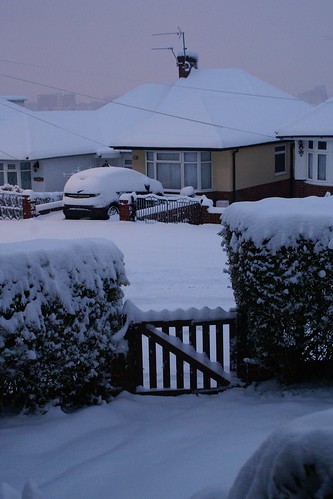
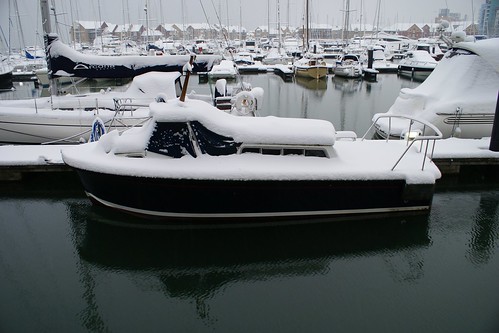
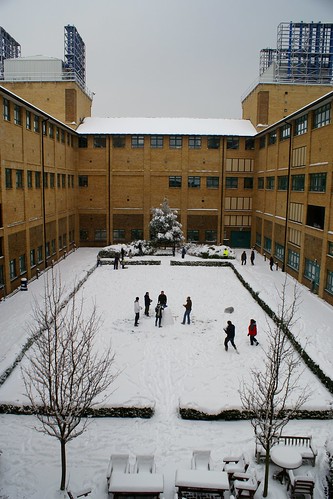
More photographs over here.
Needless to say, the standard traffic chaos came with the snow, and it was certainly a much quieter walk into work on Thursday (I didn't even dare cycle). In an unprecedented step for NOC, we even got turfed out of work early (verified by security) to take advantage of the fading sunlight and get home safely. That was a little over the top, but probably not a bad idea. Anyhow, to avoid a long hike in (made longer by my penchant for photographing every damn thing), I worked from home on Friday - and actually made more of this than usual by trying to squeeze out a grant proposal (of which more later). Today, warmer temperatures and a lot of rain is taking care of what snow didn't melt away yesterday. So, things are safer, but a lot more miserable.



More photographs over here.
Friday 3 December 2010
Crazy Heart
It's not uncommon for a terrible film to be heralded by a great trailer. Phantom Menace is, I think, king in this department, with a trailer that presents a fantastic rush of images and swells with evocative music, but which is transmogrified into a full-length morass that's simultaneously (and paradoxically) ponderous and all action-without-meaning at the same time.
This evening's DVD, Crazy Heart, achieved something a little similar but with an interesting difference: in a patchwork of just a few minutes, its trailer, which we caught a number of times at the cinema (hence this rental), presented the distilled essence of a story that the film, which contains all the same material and more, couldn't. The film looks great, is played well by its leads, and has the right scenes, but it somehow mangles them, such that the narrative fall-and-rise that's played out masterfully in the trailer, zigzags around, is repeatedly miscued and doesn't make for anything approaching a coherent emotional arc.
It's annoying because, while Phantom Menace really was an empty spectacle with a trailer that was pure salesperson's pitch, Crazy Heart, as both the trailer and film illustrate, had all the right ingredients for success. There was always the risk of disappearing into clichéd, self-destructive-musician tropes, but I think employing a narrative-blind editor was where the wheels really fell off. It's not a good day when the hatchet man from marketing brought into make the trailer has a better grip on the story than the film-makers.
This evening's DVD, Crazy Heart, achieved something a little similar but with an interesting difference: in a patchwork of just a few minutes, its trailer, which we caught a number of times at the cinema (hence this rental), presented the distilled essence of a story that the film, which contains all the same material and more, couldn't. The film looks great, is played well by its leads, and has the right scenes, but it somehow mangles them, such that the narrative fall-and-rise that's played out masterfully in the trailer, zigzags around, is repeatedly miscued and doesn't make for anything approaching a coherent emotional arc.
It's annoying because, while Phantom Menace really was an empty spectacle with a trailer that was pure salesperson's pitch, Crazy Heart, as both the trailer and film illustrate, had all the right ingredients for success. There was always the risk of disappearing into clichéd, self-destructive-musician tropes, but I think employing a narrative-blind editor was where the wheels really fell off. It's not a good day when the hatchet man from marketing brought into make the trailer has a better grip on the story than the film-makers.
Friday 26 November 2010
Trash Cinema
Even trashy films can save themselves from being total schlock by sticking to their guns and playing out the way they're supposed to. I'd even go as far as arguing (perhaps unconvincingly) that narrative missteps in a trashy film are more serious than in more mainstream fare. A stupid plot development in a trashy film can instantly convert it into total trash, whereas a comparable blunder in a more conventional film merely consigns it to the misguided bin where it can be quickly forgotten. Basically, a narrative cock-up in trash film (which, by definition, contains no redeeming features) confirms that, yes, you really did waste your time with it.
And so it is with 2012, a film that, for a good while, luxuriated in the trashy apocalypse it created and looked for all the world like it was going play out the way it had been aiming from the start: a sentimental paean to family values. Instead, John Cusack's deadbeat dad, who was surely heading for a noble death in The Poseidon Adventure mould, is spared, only for his love rival, who's more than proved himself worthy of Cusack's screen-family's love, to bite it in the closing minutes. This is not how things should have ended (nor should they have been dragged out in a ridiculously lengthy screaming-children-in-watery-peril section). Up until this point, the film had me. It was trash but, damn-it, it was good trash. But the film-makers managed to stomp all over my goodwill in a volte-face that made no narrative sense. Fools.
In passing, there was a moment, not long before the film threw everything away, where it could even have aspired to greatness by wiping out the entire human race through making the humanitarian pleadings of one of the lead characters backfire spectacularly. It would have been completely plausible, a marvellously nihilistic headstone to Man's place in the uncaring cosmos, as well as beautifully illustrative of the maxim that "no good deed goes unpunished". But, again, the film-makers totally stuffed it up. Losers.
And so it is with 2012, a film that, for a good while, luxuriated in the trashy apocalypse it created and looked for all the world like it was going play out the way it had been aiming from the start: a sentimental paean to family values. Instead, John Cusack's deadbeat dad, who was surely heading for a noble death in The Poseidon Adventure mould, is spared, only for his love rival, who's more than proved himself worthy of Cusack's screen-family's love, to bite it in the closing minutes. This is not how things should have ended (nor should they have been dragged out in a ridiculously lengthy screaming-children-in-watery-peril section). Up until this point, the film had me. It was trash but, damn-it, it was good trash. But the film-makers managed to stomp all over my goodwill in a volte-face that made no narrative sense. Fools.
In passing, there was a moment, not long before the film threw everything away, where it could even have aspired to greatness by wiping out the entire human race through making the humanitarian pleadings of one of the lead characters backfire spectacularly. It would have been completely plausible, a marvellously nihilistic headstone to Man's place in the uncaring cosmos, as well as beautifully illustrative of the maxim that "no good deed goes unpunished". But, again, the film-makers totally stuffed it up. Losers.
c.v. / Wordle / mash-up
Thursday 18 November 2010
A night (in the A&E) to remember
Well, last night was rather more eventful than expected. What started out as a few drinks with an old friend (the huntin', shootin' and fishin' DP), wound up with me spending the small hours in the A&E unit at Southampton General.
What's still a surprise to me now is that things were going swimmingly up until to about 5 minutes before they went off the rails. We'd had a nice opener of a few drinks and a chat at the Platform, then followed up with a visit to a new-ish Indian restaurant in the city centre that came highly recommended by one of our party. As it turns out, the recommendation was spot-on, and the venue and food were great.
However, just as we were close to wrapping up (and I was reflecting that, again, we'd managed to over-order; if only slightly this time), what started as mild discomfort at having eaten a lot turned into uncomfortable warmth, then steadily elevating nausea and then the fading of my vision. The former two symptoms, while unpleasant, aren't exactly new to me, but having my vision appear to degrade into fuzzy static was a novel experience. At least, not one that I usually encounter while sitting down to eat. Anyway, perturbed by the nausea, I decided to make for the restaurant's bathrooms, only to not make it there.
Next I knew, I was on the floor in the corridor that led to the bathrooms. I also felt extremely, well, attenuated, not really entirely all there. To the extent that I couldn't initially make any connection between the preceding circumstances and "waking up" on the floor. Fortunately, my fellow diners spotted my crash-landing and before long got me sat upright on some sofa that the restaurant staff had kindly directed us to. Given the outward appearance, they'd have been well within their rights to assume I was just another liquored-up punter, but they were great. As were the rest of my party, DP and JTA, both of whom did a great job sorting me out.
Anyway, after a few moments deciding what to do, during which I was still feeling rather distant, an ambulance was called (along with C). Then, in what can't have been comfortable viewing for other patrons, I was trolleyed out to the street and into the waiting ambulance. As I was still rather faded at this point, but was otherwise showing nothing too serious, the paramedics decided that they'd take me up the General for a full service.
While the journey was a bit of a blur, by the time I arrived (some indeterminate period later) I was beginning to feel like a first-order approximation to normal. After a bit of NHS bureaucracy, I was wheeled into a bay and then hooked up to another set of machines (which, painfully enough, required the removal of one set of sticky electrodes only for them to be replaced by a near-identical second set). One friendly nurse and a preliminary check-up later, and it was time for a visit from The Doctor.
Lots of questions followed about my medical history, my family's medical history and the day's history. The upshot of which was that I was diagnosed (drum-roll) as being dehydrated - a combination of a light lunch, lots of diuretic drinks (tea, a couple of beers, a coke) and a late dinner apparently. The dehydration dropped my blood pressure, and when I ate my small intestine treacherously hijacked what little was left, to the great discomfiture of my brain. Given that it was one of the strangest experiences I've had, it was a bit disappointing that it was something as mundane as dehydration. That, and I expect no shortage of jokes about putting more water in my gin in the future. Anyway, as a result of all this I got my first taste of being on a drip for the better part of an hour. Meh.
Regarding my treatment at the hands of the NHS, again no complaints from me. The staff were uniformly great, both in care and communication, and gave me an impressive working over. If I can gripe at all, there did seem to be an issue about how the relay of healthcare professionals passed the "baton". I was there for about 3 and half hours, but because of the quite large gaps between staff visits, could probably have been out at least an hour earlier, which would have freed up the slot I was occupying if nothing else. However, having thankfully not been to the A&E very often, I can't say if this was just down to the range of other patients who were in last night. Actually, on that note, I've really not the slightest of slight grounds to complain - my problems paled into insignificance compared to those of my fellow guests of the A&E.
Anyway, today I've been "resting" at home, sorting out my busted glasses (my nose looks a sight) and drinking lots of water. Overall, it's been an interesting experience, but not one I intend to ever repeat again.
What's still a surprise to me now is that things were going swimmingly up until to about 5 minutes before they went off the rails. We'd had a nice opener of a few drinks and a chat at the Platform, then followed up with a visit to a new-ish Indian restaurant in the city centre that came highly recommended by one of our party. As it turns out, the recommendation was spot-on, and the venue and food were great.
However, just as we were close to wrapping up (and I was reflecting that, again, we'd managed to over-order; if only slightly this time), what started as mild discomfort at having eaten a lot turned into uncomfortable warmth, then steadily elevating nausea and then the fading of my vision. The former two symptoms, while unpleasant, aren't exactly new to me, but having my vision appear to degrade into fuzzy static was a novel experience. At least, not one that I usually encounter while sitting down to eat. Anyway, perturbed by the nausea, I decided to make for the restaurant's bathrooms, only to not make it there.
Next I knew, I was on the floor in the corridor that led to the bathrooms. I also felt extremely, well, attenuated, not really entirely all there. To the extent that I couldn't initially make any connection between the preceding circumstances and "waking up" on the floor. Fortunately, my fellow diners spotted my crash-landing and before long got me sat upright on some sofa that the restaurant staff had kindly directed us to. Given the outward appearance, they'd have been well within their rights to assume I was just another liquored-up punter, but they were great. As were the rest of my party, DP and JTA, both of whom did a great job sorting me out.
Anyway, after a few moments deciding what to do, during which I was still feeling rather distant, an ambulance was called (along with C). Then, in what can't have been comfortable viewing for other patrons, I was trolleyed out to the street and into the waiting ambulance. As I was still rather faded at this point, but was otherwise showing nothing too serious, the paramedics decided that they'd take me up the General for a full service.
While the journey was a bit of a blur, by the time I arrived (some indeterminate period later) I was beginning to feel like a first-order approximation to normal. After a bit of NHS bureaucracy, I was wheeled into a bay and then hooked up to another set of machines (which, painfully enough, required the removal of one set of sticky electrodes only for them to be replaced by a near-identical second set). One friendly nurse and a preliminary check-up later, and it was time for a visit from The Doctor.
Lots of questions followed about my medical history, my family's medical history and the day's history. The upshot of which was that I was diagnosed (drum-roll) as being dehydrated - a combination of a light lunch, lots of diuretic drinks (tea, a couple of beers, a coke) and a late dinner apparently. The dehydration dropped my blood pressure, and when I ate my small intestine treacherously hijacked what little was left, to the great discomfiture of my brain. Given that it was one of the strangest experiences I've had, it was a bit disappointing that it was something as mundane as dehydration. That, and I expect no shortage of jokes about putting more water in my gin in the future. Anyway, as a result of all this I got my first taste of being on a drip for the better part of an hour. Meh.
Regarding my treatment at the hands of the NHS, again no complaints from me. The staff were uniformly great, both in care and communication, and gave me an impressive working over. If I can gripe at all, there did seem to be an issue about how the relay of healthcare professionals passed the "baton". I was there for about 3 and half hours, but because of the quite large gaps between staff visits, could probably have been out at least an hour earlier, which would have freed up the slot I was occupying if nothing else. However, having thankfully not been to the A&E very often, I can't say if this was just down to the range of other patients who were in last night. Actually, on that note, I've really not the slightest of slight grounds to complain - my problems paled into insignificance compared to those of my fellow guests of the A&E.
Anyway, today I've been "resting" at home, sorting out my busted glasses (my nose looks a sight) and drinking lots of water. Overall, it's been an interesting experience, but not one I intend to ever repeat again.
Friday 12 November 2010
Political observations
Two hot topics this week appear to be the changes (= cuts) to university fees and benefits.
Regarding the former, we seem to be steadily edging towards a system not dissimilar to that in the US, at least in terms of fee magnitudes. Now, I don't know the system there well enough to pronounce confidently, but this doesn't seem like the right path to promote social mobility. Back in the day (= 1980s), the absence of fees, the availability of grants, and the rationing of a more limited number of university places based on aptitude, all seemed to promote (or, at least, not discourage) such mobility. The bright future of large student debts seems likely to result in a lack of this. Certainly, I think I, and my parents, might have thought twice about me becoming the first member of my family to go to university if the proposed changes were in place in 1989.
As an aside, in all of the discussion of fees, nothing is ever said about retreating somewhat in terms of the percentage of school-leavers who go onto university. I tend to think education is always a positive, and am reluctant to consider measures to restrict it, but the more limited availability of places in the past may have kept the system of invisible fees and mildly helpful grants financially viable. Or did it? Anyway, regardless of whether I'm right or wrong on this point, it seems decidedly odd that this sort of option is off the table.
Regarding the latter hot-potato-du-jour, welfare, coverage of the government's proposed simplification of the benefits system seems to have completely overlooked any historical context. The current "byzantine" system did not appear ex nihilo at its current level of complexity. It was created simple, but evolved into the "monster" it is now because of a whole series of individually sensible responses to situations where recipients fell between the cracks. The fanfare around the Tories plan to simplify the system seems to overlook the fact that, before long, gaps in provision are liable to become obvious and the creeping rise in complexity will begin anew. In the meantime, of course, people least able to accommodate this shiny new system are liable to come unstuck dealing with its one-size-fits-all orthodoxy.
Pruning the tips of the welfare tree, or even branches where necessary, seems a far more sensible approach than hacking it right back to the trunk then allowing it to gradually regrow as uncomfortable truths come back to roost. But, fed on a junk food diet full of exaggerated tales of benefit scroungers, the public seems happy, or at least resigned, to let the Tories get on with it regardless of the short- or long-term costs, financial or social.
Regarding the former, we seem to be steadily edging towards a system not dissimilar to that in the US, at least in terms of fee magnitudes. Now, I don't know the system there well enough to pronounce confidently, but this doesn't seem like the right path to promote social mobility. Back in the day (= 1980s), the absence of fees, the availability of grants, and the rationing of a more limited number of university places based on aptitude, all seemed to promote (or, at least, not discourage) such mobility. The bright future of large student debts seems likely to result in a lack of this. Certainly, I think I, and my parents, might have thought twice about me becoming the first member of my family to go to university if the proposed changes were in place in 1989.
As an aside, in all of the discussion of fees, nothing is ever said about retreating somewhat in terms of the percentage of school-leavers who go onto university. I tend to think education is always a positive, and am reluctant to consider measures to restrict it, but the more limited availability of places in the past may have kept the system of invisible fees and mildly helpful grants financially viable. Or did it? Anyway, regardless of whether I'm right or wrong on this point, it seems decidedly odd that this sort of option is off the table.
Regarding the latter hot-potato-du-jour, welfare, coverage of the government's proposed simplification of the benefits system seems to have completely overlooked any historical context. The current "byzantine" system did not appear ex nihilo at its current level of complexity. It was created simple, but evolved into the "monster" it is now because of a whole series of individually sensible responses to situations where recipients fell between the cracks. The fanfare around the Tories plan to simplify the system seems to overlook the fact that, before long, gaps in provision are liable to become obvious and the creeping rise in complexity will begin anew. In the meantime, of course, people least able to accommodate this shiny new system are liable to come unstuck dealing with its one-size-fits-all orthodoxy.
Pruning the tips of the welfare tree, or even branches where necessary, seems a far more sensible approach than hacking it right back to the trunk then allowing it to gradually regrow as uncomfortable truths come back to roost. But, fed on a junk food diet full of exaggerated tales of benefit scroungers, the public seems happy, or at least resigned, to let the Tories get on with it regardless of the short- or long-term costs, financial or social.
Wednesday 10 November 2010
The life, and death, of a nerd
Though it's not at the head of my backlog of books to "write-up" here (3 overdue and counting), The Brief Wondrous Life of Oscar Wao is easily the book I've enjoyed the most in quite a while. So, before I forget all about it, allow me to introduce the 2008 winner of the Pulitzer Prize by the Dominican émigré and MIT professor, Junot Díaz. A novel that, bizarrely for a work of literature, I even came across this trailer for.
Taking the form of a ramshackle multi-generational family saga, the novel is built up (surprisingly enough) around the short life of Oscar Wao, a ghetto nerd growing up in present day New Jersey. Shunned because of his steadily increasingly weight and his devotion to science fiction, fantasy and comics, Oscar is further pained by his predilection for repeatedly falling in love with girls who never share his feelings. A situation that doesn't change even when Oscar goes to college, ostensibly more fruitful dating grounds. There, faced with more crushing disappointments, Oscar attempts to take his own life, but bungles his suicide bid and returns home to his family. Then a trip to his mother's homeland, the Dominican Republic (DR), opens his eyes to beauty in the world, and introduces him to an older woman who, for once, finds him engaging. But just at this point of finally finding a glimmer of happiness, Oscar's idealistic romantic streak sets him on a collision course with more malevolent forces.
Narrated largely by Yunior, Oscar's college roommate, the book also prominently features his mother Beli and his beautiful sister Lola. Beli is an unwilling émigré from the Dominican Republic (DR) who fled after attracting the near-lethal attention of the murderous regime of Rafael Trujillo. As well as describing Beli's turbulent life, Yunior also fills in the bloody history of her family's earlier descent from the respectable middle classes of the DR, first to its slums, and then to their equivalents in the US. It is a story punctuated by violent events and possible encounters with the divine that Yunior ties together in a rambling, quasi-mystical exploration of fukú, the curse, and its diametric opposite, zafa.
What a joy to read. Though it's a rambling shambles of a novel with only the loosest of loose structures to it, Oscar Wao is told with such vitality and humour that it's difficult not to be won over by it. This is largely down to the voice of the majority narrator, Yunior, who lays out Oscar's tale in a brash, conversational spanglish that brilliantly stage-manages the (broadly) tragic events. His streetwise voice animates both Oscar's and Beli's dismal lives without over-egging the pathos, and does so in a way that even paints Oscar's late self-knowledge as something of a victory despite his untimely end. But, mostly, he's really just funny, particularly so when contrasting his own vibrant love-life with Oscar's desert-like equivalent. Even when the story takes a darker turn, Yunior's vivacious telling of it prevents things from becoming too maudlin.[1]
A particular joy for a nerd like me was the novel's frequent use of stories from science fiction, fantasy and comics to parallel Oscar et al.'s lives. Various events in the narrative, good and bad, are referenced to apposite ones from iconic classics like Middle Earth, Dune and Planet of the Apes. For instance, at one point in Beli's story we're told, role-playing game-style, that a beating she receives inflicts 167 hit points of damage to her (Trujillo, we are later told, receives a fatal 400 points of damage when assassinated). Her survival, and recovery, in the face of this beating is compared to Superman's, "who drained from an entire jungle the photonic energy he needed to survive Coldbringer", in The Dark Knight Returns. And the novel closes with a direct reference to Dr. Manhattan's closing words in Watchmen, "Nothing ever ends". As well as it being nice to have touchstones from one's own (dubious) cultural-upbringing referenced, it's done with real panache here, giving the narrator (for a nerd, anyway) an extra level of verisimilitude, as well as being very funny at times.
C and I had a discussion the other night about the occurrence of the Golden Mongoose as a plot device that intervenes twice to save both Beli and Oscar from death in a Dominican canefield. She, correctly, identified the introduction as of a bit of magical realism intruding into the tale. I kind-of saw it as allegorical, and made some ridiculous argument about it being a significant character from local folklore that was almost bound to appear to people in a seriously injured, and thus altered, state. I guess that I'm just too much of a staunch realist, especially with books that I like, and am quick to subconsciously invent a dubious rationalist explanation to subvert mystical experience whenever it appears. The novel's introduction of the curse, fukú, and its counterspell, zafa, which the narrator uses as a theme to describe the events in the story, is a little similar, but much more easily put down as a allegory.
Anyhow, notwithstanding my gushing praise above, the novel got something of a drubbing at C's book group, largely for the same reasons that made it a winner in my eyes. But even so, for me it's still easily the best novel I've read in quite a while. It's not going to make my top ten,[2] but it's a joyful read, in spite of its doomed hero.
[1] He's also something of a footnote fan, and uses these throughout his portions of the book to fill in tangential information, the history of the DR and general digressions on subjects that occur to him. When I first came across these early in the book I was sure that they'd totally annoy me, but they're used relatively sparingly, and they're often quite humourously tangential asides from Yunior.
[2] Which is already out of date after the tour-de-force that is The Poisonwood Bible.
Taking the form of a ramshackle multi-generational family saga, the novel is built up (surprisingly enough) around the short life of Oscar Wao, a ghetto nerd growing up in present day New Jersey. Shunned because of his steadily increasingly weight and his devotion to science fiction, fantasy and comics, Oscar is further pained by his predilection for repeatedly falling in love with girls who never share his feelings. A situation that doesn't change even when Oscar goes to college, ostensibly more fruitful dating grounds. There, faced with more crushing disappointments, Oscar attempts to take his own life, but bungles his suicide bid and returns home to his family. Then a trip to his mother's homeland, the Dominican Republic (DR), opens his eyes to beauty in the world, and introduces him to an older woman who, for once, finds him engaging. But just at this point of finally finding a glimmer of happiness, Oscar's idealistic romantic streak sets him on a collision course with more malevolent forces.
Narrated largely by Yunior, Oscar's college roommate, the book also prominently features his mother Beli and his beautiful sister Lola. Beli is an unwilling émigré from the Dominican Republic (DR) who fled after attracting the near-lethal attention of the murderous regime of Rafael Trujillo. As well as describing Beli's turbulent life, Yunior also fills in the bloody history of her family's earlier descent from the respectable middle classes of the DR, first to its slums, and then to their equivalents in the US. It is a story punctuated by violent events and possible encounters with the divine that Yunior ties together in a rambling, quasi-mystical exploration of fukú, the curse, and its diametric opposite, zafa.
What a joy to read. Though it's a rambling shambles of a novel with only the loosest of loose structures to it, Oscar Wao is told with such vitality and humour that it's difficult not to be won over by it. This is largely down to the voice of the majority narrator, Yunior, who lays out Oscar's tale in a brash, conversational spanglish that brilliantly stage-manages the (broadly) tragic events. His streetwise voice animates both Oscar's and Beli's dismal lives without over-egging the pathos, and does so in a way that even paints Oscar's late self-knowledge as something of a victory despite his untimely end. But, mostly, he's really just funny, particularly so when contrasting his own vibrant love-life with Oscar's desert-like equivalent. Even when the story takes a darker turn, Yunior's vivacious telling of it prevents things from becoming too maudlin.[1]
A particular joy for a nerd like me was the novel's frequent use of stories from science fiction, fantasy and comics to parallel Oscar et al.'s lives. Various events in the narrative, good and bad, are referenced to apposite ones from iconic classics like Middle Earth, Dune and Planet of the Apes. For instance, at one point in Beli's story we're told, role-playing game-style, that a beating she receives inflicts 167 hit points of damage to her (Trujillo, we are later told, receives a fatal 400 points of damage when assassinated). Her survival, and recovery, in the face of this beating is compared to Superman's, "who drained from an entire jungle the photonic energy he needed to survive Coldbringer", in The Dark Knight Returns. And the novel closes with a direct reference to Dr. Manhattan's closing words in Watchmen, "Nothing ever ends". As well as it being nice to have touchstones from one's own (dubious) cultural-upbringing referenced, it's done with real panache here, giving the narrator (for a nerd, anyway) an extra level of verisimilitude, as well as being very funny at times.
C and I had a discussion the other night about the occurrence of the Golden Mongoose as a plot device that intervenes twice to save both Beli and Oscar from death in a Dominican canefield. She, correctly, identified the introduction as of a bit of magical realism intruding into the tale. I kind-of saw it as allegorical, and made some ridiculous argument about it being a significant character from local folklore that was almost bound to appear to people in a seriously injured, and thus altered, state. I guess that I'm just too much of a staunch realist, especially with books that I like, and am quick to subconsciously invent a dubious rationalist explanation to subvert mystical experience whenever it appears. The novel's introduction of the curse, fukú, and its counterspell, zafa, which the narrator uses as a theme to describe the events in the story, is a little similar, but much more easily put down as a allegory.
Anyhow, notwithstanding my gushing praise above, the novel got something of a drubbing at C's book group, largely for the same reasons that made it a winner in my eyes. But even so, for me it's still easily the best novel I've read in quite a while. It's not going to make my top ten,[2] but it's a joyful read, in spite of its doomed hero.
[1] He's also something of a footnote fan, and uses these throughout his portions of the book to fill in tangential information, the history of the DR and general digressions on subjects that occur to him. When I first came across these early in the book I was sure that they'd totally annoy me, but they're used relatively sparingly, and they're often quite humourously tangential asides from Yunior.
[2] Which is already out of date after the tour-de-force that is The Poisonwood Bible.
I ❤ MATLAB
Sunday 7 November 2010
Humane cinema
Two great, and humane, films to report from this weekend.
The first, Departures, was the Japanese winner of the Best Foreign Film Oscar in 2009. It tells the story of a cello player who, after losing his job in a Toyko orchestra, returns with his wife to his home town where he unwittingly takes a job as an undertaker. His particular three-person company specialises in highly ritualised ceremonies in which the family of the deceased are present while the, well, "undertaking" is respectfully and gracefully performed. Even so, this job brands him almost as an untouchable, even to his wife, but the narrative quietly dignifies his role, and shows how it eases the emotional suffering and pain of those left behind. It's not an entirely perfect film, and has something of a contrived loop that draws in the cellist's own family, but it's an enjoyable and satisfyingly humane piece.
The second, The Kids Are All Right, is in many ways quite a conventional family drama, but stands out both in being centred around lesbian parents and, more significantly, by not making a big deal of this. Narratively the film works really well, and has more than a few great laughs in it, but I, woolly liberal that I am, really took to its normalisation of the central relationship. Although there's no reason that this shouldn't feel right, social history suggests otherwise, so one part of the film's success for me is just making a non-traditional family credible and loving. That almost seems like a "so what?" point in this day and age, but I can't think of any other films that do the same (though that might just be me being cosseted). Anyhow, highly recommended. (Oh, and it got extra brownie points from me by finishing in my old LA workplace, Oxy.)
The first, Departures, was the Japanese winner of the Best Foreign Film Oscar in 2009. It tells the story of a cello player who, after losing his job in a Toyko orchestra, returns with his wife to his home town where he unwittingly takes a job as an undertaker. His particular three-person company specialises in highly ritualised ceremonies in which the family of the deceased are present while the, well, "undertaking" is respectfully and gracefully performed. Even so, this job brands him almost as an untouchable, even to his wife, but the narrative quietly dignifies his role, and shows how it eases the emotional suffering and pain of those left behind. It's not an entirely perfect film, and has something of a contrived loop that draws in the cellist's own family, but it's an enjoyable and satisfyingly humane piece.
The second, The Kids Are All Right, is in many ways quite a conventional family drama, but stands out both in being centred around lesbian parents and, more significantly, by not making a big deal of this. Narratively the film works really well, and has more than a few great laughs in it, but I, woolly liberal that I am, really took to its normalisation of the central relationship. Although there's no reason that this shouldn't feel right, social history suggests otherwise, so one part of the film's success for me is just making a non-traditional family credible and loving. That almost seems like a "so what?" point in this day and age, but I can't think of any other films that do the same (though that might just be me being cosseted). Anyhow, highly recommended. (Oh, and it got extra brownie points from me by finishing in my old LA workplace, Oxy.)
Saturday 6 November 2010
Fifteen in Fifteen
Prompted by Dave, the biggest music-lover I know, I cobbled together my fifteen most memorable albums in fifteen minutes for a facebook challenge he sent around. Rather than let it disappear under the ever-rising tide of facebook posts, I thought I'd reproduce it here. In part so that I can check up from time to time on whether I'd still concur with it. Anyway, it's organised here chronologically to avoid an agonising bubble sort that would take me far outside the required fifteen minute time-frame.

- Sgt. Peppers Lonely Hearts Club Band, The Beatles, 1967
- Dark Side of the Moon, Pink Floyd, 1973
- Welcome to the Pleasuredome, Frankie Goes To Hollywood, 1984
- Graceland, Paul Simon, 1986
- Life's Rich Pageant, R.E.M., 1986
- The Raw and the Cooked, Fine Young Cannibals, 1989
- The Stone Roses, The Stone Roses, 1989
- Into the Great Wide Open, Tom Petty and the Heartbreakers, 1991
- 99.9F°, Suzanne Vega, 1992
- Welcome to Wherever You Are, INXS, 1992
- Parklife, Blur, 1994
- Different Class, Pulp, 1995
- Disgraceful, Dubstar, 1995
- The Boy with the Arab Strap, Belle and Sebastian, 1998
- Bachelor No. 2, Aimee Mann, 2000

Tuesday 2 November 2010
Creationist closure
Back in August I uncharacteristically got off my fat arse and sent my MP a letter regarding the creation of so-called "free schools" by the ConDem coalition. While I can certainly imagine advantages in letting schools direct their own curricula, I can equally see how such freedom could be misused to allow creationism access to the classroom.
Anyhow, I was pleasantly surprised at the time when my MP (well, actually his private secretary) got back to me almost immediately, thanking me for making my concerns clear and promising to take these up with the appropriate government minister. The reply I received went on to say that I'd be kept abreast of any subsequent response.
Flashforward to today, and said promised reply has arrived. Both the relevant minister and my MP have affirmed that "creationism has no place in the teaching of science", and that "[c]reationism has no scientific backing and therefore cannot form part of the science National Curriculum". The letter I received was accompanied by a photocopy of the minister's response to my original letter, so I've got the full reply as well as the distilled version from my MP. I was also amused to find my name redacted from the minister's response - presumably in case the letter passed into enemy hands, or something.
Anyhow, as I also remarked last time, I'm impressed with the response I've had to my original "seething-from-Southampton" e-mail. Both with the actual handling of it (I half-expected my e-mail to disappear into a black hole), and in the apparent seriousness in which both my MP and the minister seemed to have taken it. It certainly gives one a little more confidence in the machinations of government. At least in terms of its ability to reply in platitudes to constituents.
Of course, I say the above because I got the response I hoped for. I wonder what sort of response I'd have got, and what sort of treatment, if I'd played the crazy card and requested that creationism is taught in our schools? Not a controlled experiment I intend to try out, but it'd be interesting how a reply to that sort of request would be finessed.
Anyhow, I was pleasantly surprised at the time when my MP (well, actually his private secretary) got back to me almost immediately, thanking me for making my concerns clear and promising to take these up with the appropriate government minister. The reply I received went on to say that I'd be kept abreast of any subsequent response.
Flashforward to today, and said promised reply has arrived. Both the relevant minister and my MP have affirmed that "creationism has no place in the teaching of science", and that "[c]reationism has no scientific backing and therefore cannot form part of the science National Curriculum". The letter I received was accompanied by a photocopy of the minister's response to my original letter, so I've got the full reply as well as the distilled version from my MP. I was also amused to find my name redacted from the minister's response - presumably in case the letter passed into enemy hands, or something.
Anyhow, as I also remarked last time, I'm impressed with the response I've had to my original "seething-from-Southampton" e-mail. Both with the actual handling of it (I half-expected my e-mail to disappear into a black hole), and in the apparent seriousness in which both my MP and the minister seemed to have taken it. It certainly gives one a little more confidence in the machinations of government. At least in terms of its ability to reply in platitudes to constituents.
Of course, I say the above because I got the response I hoped for. I wonder what sort of response I'd have got, and what sort of treatment, if I'd played the crazy card and requested that creationism is taught in our schools? Not a controlled experiment I intend to try out, but it'd be interesting how a reply to that sort of request would be finessed.
Thursday 28 October 2010
Staycation, days 10-11
Largely pottering days. More garden / house tidying in preparation for the arrival of my parents on the afternoon of day 11. Essentially, nothing interesting doing, but seeing as I'm now obsessionally documenting our staycation, a placeholder entry is required at least.
Oh, we did get our chimney cleaned ...

Photograph courtesy of C.
Oh, we did get our chimney cleaned ...

Photograph courtesy of C.
Tuesday 26 October 2010
Staycation, day 9
Up to London today to meet Annie, and to check out the Tate Modern's current exhibitions. The main one being a career-wide retrospective of the 19th century French artist Paul Gauguin.
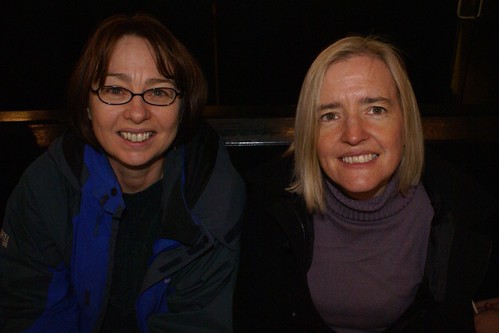
This turned out pretty well, although I'm still not especially gushing about his work. As is not uncommonly the case, a more interesting part of the exhibition was its contextualising of his work within history, particularly that of European colonialism. On this score, Gauguin has a bit of a reputation for exploitation, evidenced by his paintings of, and affairs with, local women on his various travels through the colonies. But the exhibition also brought out his conflicts with the colonial authorities (including the church), and gave the impression of nascent anti-colonial feelings in Gauguin. Although that might be just down to me skim-reading and misinterpreting the various presented documents.
We also spun around a surrealism exhibition, always fun, and a long-standing one on cubism, futurism and one other -ism that I can't now recall. As with much modern art, something of a mixed bag. Some excellent, some impenetrable, some pants (= unappealing to my aesthetic). And we took in the current Turbine Hall exhibit, Sunflower seeds, of 100 million life-like, well, sunflower seeds.
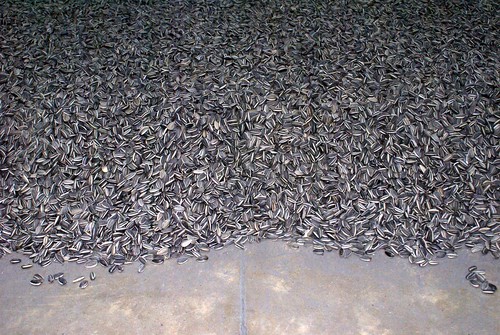
Of which, C made her own work with a handful of seeds. A different handful from the one she stole, needless to say.
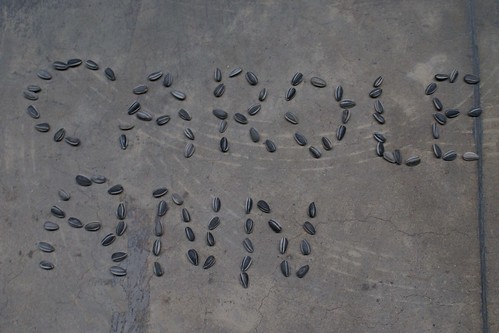
We had a nice long chat with Annie along the way, including a dissection of her recent book group meeting that trashed a book C and I liked (which I'm long overdue writing up).
And then it was a long journey home, standing room only, on the train. Not the best way to top off a day spent standing around staring at art.

This turned out pretty well, although I'm still not especially gushing about his work. As is not uncommonly the case, a more interesting part of the exhibition was its contextualising of his work within history, particularly that of European colonialism. On this score, Gauguin has a bit of a reputation for exploitation, evidenced by his paintings of, and affairs with, local women on his various travels through the colonies. But the exhibition also brought out his conflicts with the colonial authorities (including the church), and gave the impression of nascent anti-colonial feelings in Gauguin. Although that might be just down to me skim-reading and misinterpreting the various presented documents.
We also spun around a surrealism exhibition, always fun, and a long-standing one on cubism, futurism and one other -ism that I can't now recall. As with much modern art, something of a mixed bag. Some excellent, some impenetrable, some pants (= unappealing to my aesthetic). And we took in the current Turbine Hall exhibit, Sunflower seeds, of 100 million life-like, well, sunflower seeds.

Of which, C made her own work with a handful of seeds. A different handful from the one she stole, needless to say.

We had a nice long chat with Annie along the way, including a dissection of her recent book group meeting that trashed a book C and I liked (which I'm long overdue writing up).
And then it was a long journey home, standing room only, on the train. Not the best way to top off a day spent standing around staring at art.
Monday 25 October 2010
Staycation, day 8
Out today to Portsmouth to visit Barbara and Alan in the PM. To make something more out of the short hop eastwards, we stopped off along the way in Portchester. Though it's hardly a fair way to judge a city and its surrounds, because of Portsmouth's relatively high population density, I've always tended to write-off anything within spitting distance of it. Including the across-the-water Portchester. How wrong could I have been?
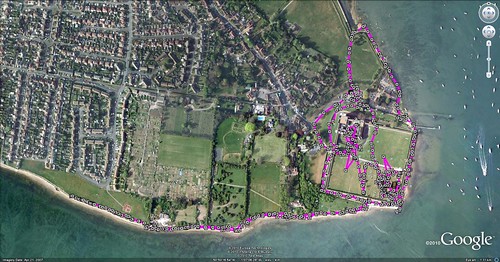
Very, as it turns out. Though the town itself is not a whole lot to write home about (or even write blog about), it's got a great seafront, which includes the excellent Portchester Castle. The map above shows the short (5.3 km) walk that we did around and through it.
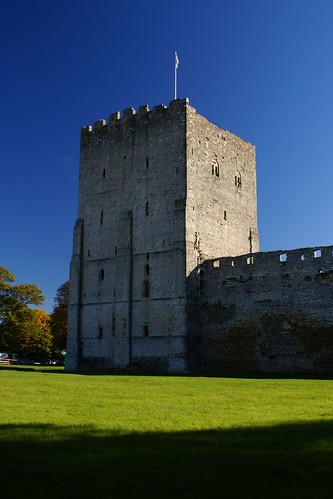
This shot shows the most intact part of the castle, its keep (in the NW corner of the map), but the remainder is in pretty fair shape too, at least relative to more tumbledown affairs like St. Andrews. Including some great walls. The castle grounds also include a church, St. Marys, and both external and internal moats (the latter around the keep).

As the above panorama hopefully shows, the castle also affords great sea views over to Portsmouth itself. Seen from this distance the city actually looks appealing! ;-)
Anyway, a pleasingly surprising trip out east. And another great day for it - the weather could not have been better (cf. the deep blue sky above). And followed up with a nice catch-up in Portsmouth itself. In particular, Alan was in great form.
More photos over at Flickr.

Very, as it turns out. Though the town itself is not a whole lot to write home about (or even write blog about), it's got a great seafront, which includes the excellent Portchester Castle. The map above shows the short (5.3 km) walk that we did around and through it.

This shot shows the most intact part of the castle, its keep (in the NW corner of the map), but the remainder is in pretty fair shape too, at least relative to more tumbledown affairs like St. Andrews. Including some great walls. The castle grounds also include a church, St. Marys, and both external and internal moats (the latter around the keep).

As the above panorama hopefully shows, the castle also affords great sea views over to Portsmouth itself. Seen from this distance the city actually looks appealing! ;-)
Anyway, a pleasingly surprising trip out east. And another great day for it - the weather could not have been better (cf. the deep blue sky above). And followed up with a nice catch-up in Portsmouth itself. In particular, Alan was in great form.
More photos over at Flickr.
Sunday 24 October 2010
Staycation, day 7
Out to Romsey today for the annual pre-Christmas fair at Broadlands country house. We didn't do terribly well getting presents for anyone else, but did much better getting ourselves new hats and gloves for the winter.
The afternoon was spent faffing around at home doing various odd jobs in the house and the garden. In freeing up the camera, however, it did allow an opportunity to create a time-lapse of Pushkin in action (well, what passes for action with her) ...
The afternoon was spent faffing around at home doing various odd jobs in the house and the garden. In freeing up the camera, however, it did allow an opportunity to create a time-lapse of Pushkin in action (well, what passes for action with her) ...
Saturday 23 October 2010
Staycation, day 6
More shopping chores around Southampton this morning. It's frankly embarrassing that it took a holiday for me to drag myself to Staples to replace our printer's toner cartridges, but there it is.
Out in the afternoon with John and Meriel. Just a walk along Weston Shore to the playground there followed by cake. And, yes, I did have a go on the swings. I don't know whether it's the warm memory of a childhood activity, or just the physical pleasure of building up a head of steam against gravity, but it's always fun.
Out in the afternoon with John and Meriel. Just a walk along Weston Shore to the playground there followed by cake. And, yes, I did have a go on the swings. I don't know whether it's the warm memory of a childhood activity, or just the physical pleasure of building up a head of steam against gravity, but it's always fun.
Friday 22 October 2010
Staycation, day 5
With our cat in for a check-up at the vets in the afternoon, we didn't have as long for a walk today. Hoping to catch some autumn colour, we headed out to Boldrewood in the New Forest, which an article in a newspaper claimed was suitable ...
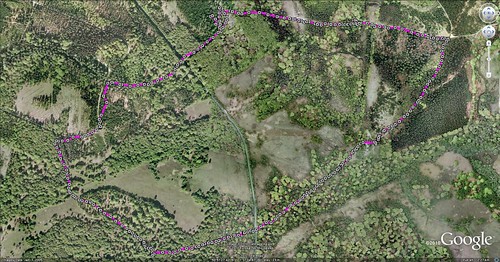
While it was certainly a nice day out in the forest (albeit a very short walk; 5.7 km), it wasn't particularly autumnal. Though the portion of the forest we visited had more than a few evergreens, there were enough deciduous to have made a show in principle, but they weren't playing ball. The closest we got was with the bracken on the forest floor ...

We also rediscovered just how difficult it is to find decent vegetarian options in rural pubs. After trying about four different places on the route back to Southampton, we gave up and had a sulky lunch back at home.
In passing, Pushkin checked out largely OK on her visit to the vet. Thyroid still shot to pieces, but acceptably aberrant for 18.5 years of age.
A few more photographs over at Flickr.

While it was certainly a nice day out in the forest (albeit a very short walk; 5.7 km), it wasn't particularly autumnal. Though the portion of the forest we visited had more than a few evergreens, there were enough deciduous to have made a show in principle, but they weren't playing ball. The closest we got was with the bracken on the forest floor ...

We also rediscovered just how difficult it is to find decent vegetarian options in rural pubs. After trying about four different places on the route back to Southampton, we gave up and had a sulky lunch back at home.
In passing, Pushkin checked out largely OK on her visit to the vet. Thyroid still shot to pieces, but acceptably aberrant for 18.5 years of age.
A few more photographs over at Flickr.
Thursday 21 October 2010
Staycation, day 4
One of the disadvantages of a staycation is being based at home and, thus, acutely aware of household chores that need doing. Consequently, today we felt obliged to have a kitchen sort-out, and to give the garden its last blast before the onset of winter. Au revoir Thursday.
Wednesday 20 October 2010
Staycation, day 3
Out today to the north of Hampshire to visit, first, a craft centre up in Andover, and then on for a hike in nearby Harewood Forest.
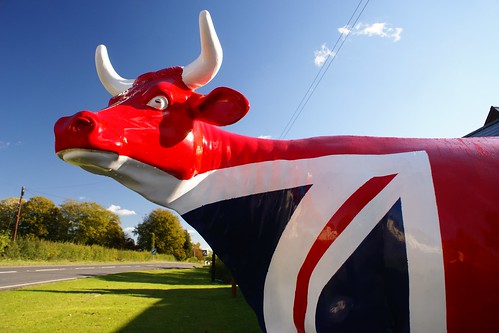
Our first stop was an old fairground just to the west of Andover that's been converted into a series of arts and crafts shops (actually, they looked more like former stables). A few interesting bits and bobs to see, but not a whole heap to buy. One or two of the shops were actually pretty specialist, and very much at the pricey end of the crafts places we've visited. Just down the road, we came across the colourful bovine pictured above, the mascot for a local farm shop, but one we first mistook for a Cow Parade escapee.
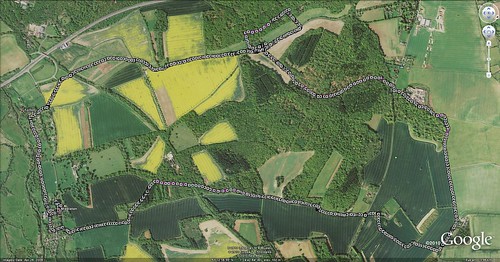
Our hike was a fairly easygoing circular trek through 13.1 km of Harewood Forest just to the east of Andover. The weather was just about perfect, with nearly constant sunshine keeping the temperature (and, latterly, our spirits) up. We did get distracted by a futile wild goose chase to find some ancient monument deep in the woods, but otherwise the hike went more or less according to plan (= as per our walk book).
The trail itself was a mix of farmland and forest, so was a little more varied than many of the walks we do in Hampshire. It actually took in a portion of the Test Way, so it was also more straightforward to navigate. And, oddly, we had it completely to ourselves - we never met, or even saw, anyone else on it. Not an especially photogenic walk, but there were some nice vistas across rolling fields, and (I presume) the high chalk content of the soil made for a nice range of browns across the ploughed fields ...

As usual, photos over at Flickr.

Our first stop was an old fairground just to the west of Andover that's been converted into a series of arts and crafts shops (actually, they looked more like former stables). A few interesting bits and bobs to see, but not a whole heap to buy. One or two of the shops were actually pretty specialist, and very much at the pricey end of the crafts places we've visited. Just down the road, we came across the colourful bovine pictured above, the mascot for a local farm shop, but one we first mistook for a Cow Parade escapee.

Our hike was a fairly easygoing circular trek through 13.1 km of Harewood Forest just to the east of Andover. The weather was just about perfect, with nearly constant sunshine keeping the temperature (and, latterly, our spirits) up. We did get distracted by a futile wild goose chase to find some ancient monument deep in the woods, but otherwise the hike went more or less according to plan (= as per our walk book).
The trail itself was a mix of farmland and forest, so was a little more varied than many of the walks we do in Hampshire. It actually took in a portion of the Test Way, so it was also more straightforward to navigate. And, oddly, we had it completely to ourselves - we never met, or even saw, anyone else on it. Not an especially photogenic walk, but there were some nice vistas across rolling fields, and (I presume) the high chalk content of the soil made for a nice range of browns across the ploughed fields ...

As usual, photos over at Flickr.
Tuesday 19 October 2010
Staycation, day 2
Out today to visit the Cass Sculpture Foundation in Goodwood, just to the north of Chichester.
While it's an outdoor sculpture park much like another we visited earlier this year, it very much caters to the larger (and more expensive) sculpture demographic. Even the smallest were still quite large, but I see this as a definite advantage for outdoor "galleries", where the scale of the environment can diminish conventionally-sized works. Little chance of that here (see, especially, "Alfa" below), and the works are further helped by sympathetic positioning within some lovely grounds.
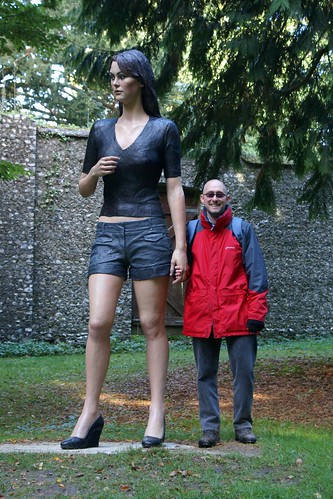
This one, "Woman", was definitely one of my favourites (and not just because of the sculpture abuse possibilities). From a distance it first appeared to be a visitor to the park, but as we got closer its scale became more obviously alien. It should have been a little representational for my tastes, but the quality of the representation, as well as its intrinsically otherworldly size, made it stand out to me.

"Alfa" is the biggest and best example of giantism in the sculpture at the Cass park. A bright orange loop of steel tubing, it towers above all of the neighbouring sculptures and even the trees that fill the park. So it's immediately impressive, if rather difficult to photograph.

Another attractive one, almost like a child's mobile, is "Sun and Moon", a big-scale (though not up to that of "Alfa") work representing, obviously enough, the sun (background) and the moon (foreground). Doubling up as our lunch site, this got more scrutiny that many of the others.

After finishing up at the park, we headed down to nearby Chichester for a trawl around the shops and a visit to the city's impressive cathedral. The latter visit also drew in a great coffee and cake stop - a theologically perplexing use of the Lord's House. Was this a watering of the attendant faithful, or an angling for the attention of the faithless using lemon cake as bait? Either way, the cathedral was an excellent stop.
As ever, there's a full set of photographs over at Flickr.
While it's an outdoor sculpture park much like another we visited earlier this year, it very much caters to the larger (and more expensive) sculpture demographic. Even the smallest were still quite large, but I see this as a definite advantage for outdoor "galleries", where the scale of the environment can diminish conventionally-sized works. Little chance of that here (see, especially, "Alfa" below), and the works are further helped by sympathetic positioning within some lovely grounds.

This one, "Woman", was definitely one of my favourites (and not just because of the sculpture abuse possibilities). From a distance it first appeared to be a visitor to the park, but as we got closer its scale became more obviously alien. It should have been a little representational for my tastes, but the quality of the representation, as well as its intrinsically otherworldly size, made it stand out to me.

"Alfa" is the biggest and best example of giantism in the sculpture at the Cass park. A bright orange loop of steel tubing, it towers above all of the neighbouring sculptures and even the trees that fill the park. So it's immediately impressive, if rather difficult to photograph.

Another attractive one, almost like a child's mobile, is "Sun and Moon", a big-scale (though not up to that of "Alfa") work representing, obviously enough, the sun (background) and the moon (foreground). Doubling up as our lunch site, this got more scrutiny that many of the others.

After finishing up at the park, we headed down to nearby Chichester for a trawl around the shops and a visit to the city's impressive cathedral. The latter visit also drew in a great coffee and cake stop - a theologically perplexing use of the Lord's House. Was this a watering of the attendant faithful, or an angling for the attention of the faithless using lemon cake as bait? Either way, the cathedral was an excellent stop.
As ever, there's a full set of photographs over at Flickr.
Monday 18 October 2010
Staycation, day 1
We're having a staycation this autumn, largely so that we can keep an eye on the recently-ailing Pushkin (though the prospect of losing our jobs through the imminent cuts hasn't gone unnoticed). Anyway, because I've been away over the weekend, Day 1 strongly emphasised the "stay" part of our staycation so that we can do chores.
That said, we did manage out to see The Social Network in a late-afternoon screening that amassed an impressive 5 cinema-goers (including us). And it turned out to be a surprisingly good film. Perhaps not surprising given the writer and director, but the latter was most recently responsible for a true stinker. Anyhow, I understand that its relationship to reality may be a tad hazy in places, but it's a pretty good stab at turning a dot-com success story into a credible and engaging story. Though I won't be rushing to up my visit-rate to Facebook.
That said, we did manage out to see The Social Network in a late-afternoon screening that amassed an impressive 5 cinema-goers (including us). And it turned out to be a surprisingly good film. Perhaps not surprising given the writer and director, but the latter was most recently responsible for a true stinker. Anyhow, I understand that its relationship to reality may be a tad hazy in places, but it's a pretty good stab at turning a dot-com success story into a credible and engaging story. Though I won't be rushing to up my visit-rate to Facebook.
Sunday 17 October 2010
The Big Four-Zero
Up to Oxfordshire this past weekend, to a small town called Burford (not to be confused with Burwash), for Dr. M's 40th birthday party. On my own this time though as, unfortunately, C had to stay home for this one to nurse an ailing cat (though Pushkin appears to be making a recovery).
We were staying in a place called Wysdom Hall, an extremely quaint 16th century guest house which doubled up as our canteen for the weekend. It was a truly strange concoction of a building in which every bedroom was different in proportion and layout from the last, that had a plethora of interconnected lounges, and which felt like it had been grown rather than built. So an excellently sprawling venue for a typically sprawling event, and attended by frequently sprawled guests. Though it was a little too late in the year to be making full use of it, the hall also sat in some great "cottage garden" grounds that afforded, needless to say, many Kodak-moments.

The order of ceremony was: arrive → late dinner → drinks → crash → unruly breakfast → moderately long but easy walk → extended dinner preparation → extended dinner → drinks and games → crash → kitchen cleanup → unruly breakfast → gradual sloping off of attendees. As ever, alcohol was freely flowing, language was the traditional mix of in-jokes and profanity, dinner was served at length in extremely generous portions, and it was all topped off with a hard-fought tournament of the Name Game[*].

The walk was an enjoyable 10.1 km jaunt through the countryside around Burford. While it did occasionally take in terrain that wasn't entirely appropriate for the in-buggy 11 month old who accompanied us, on the whole the going was pretty straightforward. And it was long enough for each of us to gradually chat our way through the whole walking party which, given that I've not seen many of the crew for quite some time, was very enjoyable. There have been a few changes in jobs and locations since last time, but generally things remain fairly similar. In a couple of cases, there was a lot to report (e.g. Chris' various travels), but it's still a little surprising, and comforting, at how things also stay the same.

As ever, I came away feeling rather privileged at being included in the event. My connection to the group is more peripheral than the bond between the core, but I'm always made welcome, and I always enjoy the chance to shoot the breeze with such a diverse group of friends. This time particularly, since Dr. M's brother and sister were able to join us, and they're always excellent value.
Anyway, as usual, more photos over at Flickr.
[*] The Name Game: Assemble two equal-sized teams; distribute paper and pens; tear paper into small, equal-sized pieces; write the name of a famous (either generally, or specific to the group playing) personage on each piece of paper; fold the papers and place them in a holding vessel; round 1: allow 30-60 seconds for a member of each team to draw paper from the vessel and attempt to describe the person with naming them; round 2: as round 1, but players can only use a single word to describe the person; round 3: as round 1, but players can only use the medium of mime; round 4+: typically unsuccessful (and drunken) rounds that involve successively restrictive modes of communication, e.g. hands-only, staring. "Famous" names typically include: figures currently in the news (e.g. Ed/David Miliband); semi-celebrities with comedy names (e.g. Christopher Lillicrap); sportsmen or women known only to the person who wrote them down (e.g. David Gower); friends not present at the party (e.g. Martin West); celebrities with dubious (but describable in a single word) sexual history (e.g. Gillian Taylforth); and occasional wild-cards (e.g. this weekend's was Goat Peter, immortalised in an adaptation of Heidi most of us remembered from our school years). Repeat playings of the game with the same group of people invariably leads to the selection of "favourites" who recur every time, and by the inclusion of former players as subjects whose faults (or otherwise) can be discussed at length in round 1 (e.g. Alistair Cockwank). These features can make it difficult to introduce new players to the game, and should be guarded against.
We were staying in a place called Wysdom Hall, an extremely quaint 16th century guest house which doubled up as our canteen for the weekend. It was a truly strange concoction of a building in which every bedroom was different in proportion and layout from the last, that had a plethora of interconnected lounges, and which felt like it had been grown rather than built. So an excellently sprawling venue for a typically sprawling event, and attended by frequently sprawled guests. Though it was a little too late in the year to be making full use of it, the hall also sat in some great "cottage garden" grounds that afforded, needless to say, many Kodak-moments.

The order of ceremony was: arrive → late dinner → drinks → crash → unruly breakfast → moderately long but easy walk → extended dinner preparation → extended dinner → drinks and games → crash → kitchen cleanup → unruly breakfast → gradual sloping off of attendees. As ever, alcohol was freely flowing, language was the traditional mix of in-jokes and profanity, dinner was served at length in extremely generous portions, and it was all topped off with a hard-fought tournament of the Name Game[*].

The walk was an enjoyable 10.1 km jaunt through the countryside around Burford. While it did occasionally take in terrain that wasn't entirely appropriate for the in-buggy 11 month old who accompanied us, on the whole the going was pretty straightforward. And it was long enough for each of us to gradually chat our way through the whole walking party which, given that I've not seen many of the crew for quite some time, was very enjoyable. There have been a few changes in jobs and locations since last time, but generally things remain fairly similar. In a couple of cases, there was a lot to report (e.g. Chris' various travels), but it's still a little surprising, and comforting, at how things also stay the same.

As ever, I came away feeling rather privileged at being included in the event. My connection to the group is more peripheral than the bond between the core, but I'm always made welcome, and I always enjoy the chance to shoot the breeze with such a diverse group of friends. This time particularly, since Dr. M's brother and sister were able to join us, and they're always excellent value.
Anyway, as usual, more photos over at Flickr.
[*] The Name Game: Assemble two equal-sized teams; distribute paper and pens; tear paper into small, equal-sized pieces; write the name of a famous (either generally, or specific to the group playing) personage on each piece of paper; fold the papers and place them in a holding vessel; round 1: allow 30-60 seconds for a member of each team to draw paper from the vessel and attempt to describe the person with naming them; round 2: as round 1, but players can only use a single word to describe the person; round 3: as round 1, but players can only use the medium of mime; round 4+: typically unsuccessful (and drunken) rounds that involve successively restrictive modes of communication, e.g. hands-only, staring. "Famous" names typically include: figures currently in the news (e.g. Ed/David Miliband); semi-celebrities with comedy names (e.g. Christopher Lillicrap); sportsmen or women known only to the person who wrote them down (e.g. David Gower); friends not present at the party (e.g. Martin West); celebrities with dubious (but describable in a single word) sexual history (e.g. Gillian Taylforth); and occasional wild-cards (e.g. this weekend's was Goat Peter, immortalised in an adaptation of Heidi most of us remembered from our school years). Repeat playings of the game with the same group of people invariably leads to the selection of "favourites" who recur every time, and by the inclusion of former players as subjects whose faults (or otherwise) can be discussed at length in round 1 (e.g. Alistair Cockwank). These features can make it difficult to introduce new players to the game, and should be guarded against.
Thursday 30 September 2010
Advice to a new student
As of the start of this week, I'm officially the co-supervisor of a PhD. student. Technically, she really "belongs" to a colleague, but I expect to play a role in her work, and today we had our first, largely informal meeting with her. Suddenly things feel all grown-up.
Anyway, the thought occurs: What advice would I give a new PhD. student? There are lots of obvious, practical things, but what else did I learn (or, more commonly, not learn) from my own studies back in the 1990s? The following are the first 10 things that crossed my mind ...
Anyway, the thought occurs: What advice would I give a new PhD. student? There are lots of obvious, practical things, but what else did I learn (or, more commonly, not learn) from my own studies back in the 1990s? The following are the first 10 things that crossed my mind ...
- You do not need to fully read and comprehend every paper that you come across
- Don't shy from presenting your work: you need the practice, and the thick skin
- Try to publish something while you're still a student; get over the idea that papers are written by "gods"
- Your "superiors" do not know everything; ignorance does not make you an idiot
- No matter what time you start and finish, there will always be fellow students who seem to work harder than you; secret: they're not
- Try to recognise perfectionism in your thesis-writing and get over it
- Enjoy your PhD studies; they give you a freedom to try things that you'll never have again
- Take your full allowance of holidays; try not to work weekends until you have to
- You will make some of your best friends during your studies; don't lose them trying to sort out your career
- LATEX is the best way to write your thesis
Wednesday 29 September 2010
The Book with the Huge Print-run
A bit of a change of pace this time with a dip into the world of the literary phenomenon by way of The Girl with the Dragon Tattoo, the multi-million copy-selling crime novel by the Swedish, journalist-cum-novelist Stieg Larsson. So, is it, like The Da Vinci Code, just another over-hyped example of the paucity of mass market taste? Or does it live up to the word-of-mouth fanfare?
Mikael Blomkvist is stuffed. His latest corporate exposé of a corrupt industrialist has backfired, and ostensibly rock-solid evidence has melted in the courts and landed him a short term in prison, as well as threatened the future of the small, independent magazine he works for. But his mass media infamy has brought him to the attention of another industrialist, Henrik Vanger, with a decades-old mystery to solve. Taunted by the annual arrival of a floral memento, and compelled by his advancing years, Vanger offers Blomkvist the chance to save his employer from financial ruin by investigating the disappearance, and presumed murder, of his favourite niece, Harriet. Vanger also does some investigating of his own, hiring a hacker, Lisbeth Salander, the eponymous "girl with the dragon tattoo", to uncover the truth behind Blomkvist's imprisonment. But the obsessive Salander's interest in her assignment doesn't end when she files her report. Before long she too becomes involved in unravelling the fate of Harriet, and joins Blomkvist in an investigation that unearths a succession of unpleasant revelations about the Vanger clan and its past, and which exposes both to very present dangers.
Overall, a well-plotted and enjoyable thriller, marred slightly by an overly light touch on the part of Larsson's editor. The latter never comes close to derailing the novel, but it does make for some long-winded passages, redundant characters and occasionally purple prose (though the translator may bear some responsibility here). The strongest aspect of the novel is its central mystery, but Larsson does a good job of blending in Blomkvist's original investigation, as well as Salander's abused background. Larsson's writing is rather flat-footed at times, which isn't a huge surprise given this was his first novel, but even so his characters come alive much more convincingly than those of fellow best-selling authors like Michael Crichton, Dan Brown and (the horror) Jeffrey Archer.
Perhaps unsurprisingly given Larsson's real-life job as a campaigning journalist, the novel is not content spinning a yarn, and works in a more serious theme from modern Sweden. This is implied by both Salander's story and the resolution of Harriet's disappearance, but is brought front-and-centre by the statistics that are quoted at the head of each chapter. These document the abuse by men that Swedish women are at the receiving end of, and the resulting second-class status that women occupy. The engagement of such a crowd-pleasing novel with this more stark message is pleasing, although the message is something of a surprise given the wide perception of Sweden as a modern, liberal nation. Reading of Sweden's problems certainly raises suspicions that one's own country isn't quite as egalitarian as hitherto believed.
As I've also seen the film, it's interesting to make comparisons. Normally, the transition from page to screen is a series of compromises that preserves only the events and not the content of a novel, with the result that film adaptations are typically met by outrage from fans of the book. However, in this case, I think that fans of the film might well greet the novel with brickbats. In adapting the book, the film-makers have given it the trim that it really needed from its editor. Extraneous detail, particularly that concerning characters we don't need to know about, is removed, and the film is a far leaner thriller that simply works better for my money. The film-makers also tell the story much more from Blomkvist's perspective, leaving Salander with something of an air of mystery that works in favour of her character. By delving deeper into Salander's life, as well as into the lives of other peripheral characters, the novel is, at times, simply too blunt. Admittedly, I doubt that I'd have been quite as attuned to the novel's flab had I read it before seeing the film, but it's difficult not to reach the conclusion that Larsson's editor did little more than correct the punctuation.
As a final biographical aside, for all of its positive aspects, the novel does occasionally come across a bit transparently as a fantasy life for its author. Much like Larsson was, Blomkvist is a successful investigative journalist in his 40s who, much like one suspects Larsson wanted, has something of a rakish appeal to women. In one of the more glaring I-can't-believe-I-just-read-that moments, Blomkvist arrives at the doorstep of one of the female Vangers only to be invited lustily in and promptly shagged. This sort of thing does tend to diminish the more serious aspects of sexual politics that Larsson introduces to the novel. Needless to say, the film-makers clocked this rather implausible wish-fulfilment and gave the characters a more credibly-paced relationship.
Anyhow, it's easily good enough a read to convince me to read through the successor volumes of the Millennium Trilogy. But I definitely fear diminishing returns.
Mikael Blomkvist is stuffed. His latest corporate exposé of a corrupt industrialist has backfired, and ostensibly rock-solid evidence has melted in the courts and landed him a short term in prison, as well as threatened the future of the small, independent magazine he works for. But his mass media infamy has brought him to the attention of another industrialist, Henrik Vanger, with a decades-old mystery to solve. Taunted by the annual arrival of a floral memento, and compelled by his advancing years, Vanger offers Blomkvist the chance to save his employer from financial ruin by investigating the disappearance, and presumed murder, of his favourite niece, Harriet. Vanger also does some investigating of his own, hiring a hacker, Lisbeth Salander, the eponymous "girl with the dragon tattoo", to uncover the truth behind Blomkvist's imprisonment. But the obsessive Salander's interest in her assignment doesn't end when she files her report. Before long she too becomes involved in unravelling the fate of Harriet, and joins Blomkvist in an investigation that unearths a succession of unpleasant revelations about the Vanger clan and its past, and which exposes both to very present dangers.
Overall, a well-plotted and enjoyable thriller, marred slightly by an overly light touch on the part of Larsson's editor. The latter never comes close to derailing the novel, but it does make for some long-winded passages, redundant characters and occasionally purple prose (though the translator may bear some responsibility here). The strongest aspect of the novel is its central mystery, but Larsson does a good job of blending in Blomkvist's original investigation, as well as Salander's abused background. Larsson's writing is rather flat-footed at times, which isn't a huge surprise given this was his first novel, but even so his characters come alive much more convincingly than those of fellow best-selling authors like Michael Crichton, Dan Brown and (the horror) Jeffrey Archer.
Perhaps unsurprisingly given Larsson's real-life job as a campaigning journalist, the novel is not content spinning a yarn, and works in a more serious theme from modern Sweden. This is implied by both Salander's story and the resolution of Harriet's disappearance, but is brought front-and-centre by the statistics that are quoted at the head of each chapter. These document the abuse by men that Swedish women are at the receiving end of, and the resulting second-class status that women occupy. The engagement of such a crowd-pleasing novel with this more stark message is pleasing, although the message is something of a surprise given the wide perception of Sweden as a modern, liberal nation. Reading of Sweden's problems certainly raises suspicions that one's own country isn't quite as egalitarian as hitherto believed.
As I've also seen the film, it's interesting to make comparisons. Normally, the transition from page to screen is a series of compromises that preserves only the events and not the content of a novel, with the result that film adaptations are typically met by outrage from fans of the book. However, in this case, I think that fans of the film might well greet the novel with brickbats. In adapting the book, the film-makers have given it the trim that it really needed from its editor. Extraneous detail, particularly that concerning characters we don't need to know about, is removed, and the film is a far leaner thriller that simply works better for my money. The film-makers also tell the story much more from Blomkvist's perspective, leaving Salander with something of an air of mystery that works in favour of her character. By delving deeper into Salander's life, as well as into the lives of other peripheral characters, the novel is, at times, simply too blunt. Admittedly, I doubt that I'd have been quite as attuned to the novel's flab had I read it before seeing the film, but it's difficult not to reach the conclusion that Larsson's editor did little more than correct the punctuation.
As a final biographical aside, for all of its positive aspects, the novel does occasionally come across a bit transparently as a fantasy life for its author. Much like Larsson was, Blomkvist is a successful investigative journalist in his 40s who, much like one suspects Larsson wanted, has something of a rakish appeal to women. In one of the more glaring I-can't-believe-I-just-read-that moments, Blomkvist arrives at the doorstep of one of the female Vangers only to be invited lustily in and promptly shagged. This sort of thing does tend to diminish the more serious aspects of sexual politics that Larsson introduces to the novel. Needless to say, the film-makers clocked this rather implausible wish-fulfilment and gave the characters a more credibly-paced relationship.
Anyhow, it's easily good enough a read to convince me to read through the successor volumes of the Millennium Trilogy. But I definitely fear diminishing returns.
Tuesday 28 September 2010
Low brow
While I'm usually a defender of the internet, and (generally) oppose attempts by others to present it as the route by which barbarians will storm and overwhelm civilisation, the evidence does sometimes run against me. For instance, it's revealing that the most popular photograph (73 hits and rising) from a recent set uploaded to Flickr is none other than this rather, well, lower brow item ...
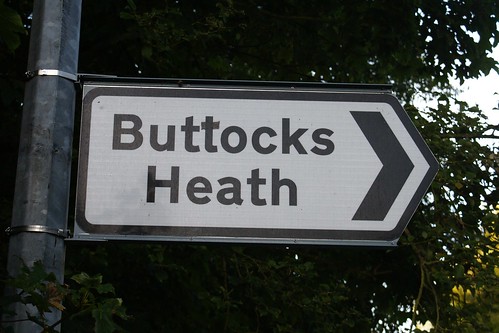
Still, since I took the photograph for all of the obvious reasons, I can hardly claim the high ground. Clearly I'm part of the problem when it comes to internet dumbing-down and coarsening.

Still, since I took the photograph for all of the obvious reasons, I can hardly claim the high ground. Clearly I'm part of the problem when it comes to internet dumbing-down and coarsening.
Monday 27 September 2010
Red Ed Redemption
Saturday 25 September 2010
Grand Theft Jungle
I'm back in game-reviewing mode with another birthday present, the Africa-set FPS Far Cry 2 (FC2), an ostensible sequel to the 2004 shooter Far Cry. There, the player took on enhanced mutant soldiers in a beautifully-rendered tropical paradise; here, the player takes on a task involving a failed state and blood diamonds, subjects more familiar from the evening news than from science fiction.
Set within a war-torn African state on the verge of complete collapse, FC2 sends the player to catch up with, and then eliminate, an arms dealer known as the Jackal. By supplying both sides in the conflict with weapons, the Jackal has greatly displeased the player's employers, who just want to get on with the job of bleeding the country dry. However, the player's first catch of the day is malaria, which leaves him incapacitated and defenceless in his hotel room. Fortunately, the Jackal is mysteriously at hand to medicate the player, and save him from an ongoing (and curiously simultaneous) gun battle in the town, before disappearing off once more.
Back on his feet, but still needing the occasional dose of anti-malarial drugs, the player finds himself between two opposing paramilitary factions, both eager to eliminate the other and take the spoils of the country, oil and blood diamonds, for themselves. Along with a number of other foreign national NPCs, who can be buddied up with, the player then takes the role of a mercenary, ultimately working for both sides on a succession of missions. These usually involve a long journey, by road or river, through hostile territory (= the whole game map), followed by an intense period of combat during which something, or someone, is stolen, destroyed or assassinated. The reward for mission completion is payment in blood diamonds, which can then be used to buy better weapons, equipment and training. Missions need not be followed to the letter, and the player's buddies frequently interject alternative completion pathways that net better rewards and strengthen buddy "history".
Alongside missions for the warring factions, the player can also undertake slightly more humanitarian tasks, such as transporting passports to innocent bystanders trying to flee the country, and helping a journalist recover incriminating audio recordings of the Jackal. Needless to say, there are also GTA-style assassination missions handed out by a mysterious stranger at the end of a phone line, though these pay in diamonds rather than malaria medicine or hearty thanks. And, along the way, the Jackal occasionally drops in on the player to offer advice or help. Odd behaviour indeed for someone the player is supposed to be "taking care of", but then the Jackal isn't quite what he appears, and he needs someone fresh off the plane to help him achieve his goals against an army of parasitic mercs.
First of all, the woefully misnamed FC2 (which has nothing whatsoever to do with Far Cry) is a lot of fun to play, and I really enjoyed the time I spent shooting my way through its various obstacles. However, the developers of FC2 have fallen into the classic trap of focusing on technical aspects of the game and neglecting the story till the last minute. In terms of how it looks, sounds and "feels", the African setting of FC2 is beautifully well-realised, with great jungle, savannah and desert settings, and impressive attention to detail on architecture and interiors. The combat dynamics are similarly well-honed, with (relatively) smart enemies that fight, track and ambush the player convincingly, and with the novel addition of fast-spreading fire that opens up unique battlefield opportunities. All these bits are great, but the realism that they bring evaporates when they're practically crippled by the story that's bolted onto them.
To be fair, the story tries to reach beyond the clichés that are the de facto standard in gaming. For instance, rather than posit (cf. Just Cause) a morally unambiguous "black hat" for the player to hunt down and "terminate with extreme prejudice", FC2's target-cum-antagonist saves the player's life at the start of the game, and pops up from time to time in a manner that suggests (in the clunkiest manner possible) that perhaps he's wearing a grey hat. This isn't a bad premise for a game (and something like it is what I'd hoped Just Cause would try for), but it's more or less the whole of the story. The rest of the game is simply a series of unconnected missions and events that, while a lot of fun, are completely incoherent.
While I began the game worrying about the consequences of my actions (cf. the sublime Fallout 3), it quickly became clear that, beyond the end of the current mission, there were none. Further, if I didn't complete the requested theft / armed assault / assassination, I'd simply not see the rest of the game. That was a tolerable mechanic in earlier games (GTA IV being about the last of them), but now it makes for an air of non-realism that can't be offset by immaculately realistic game physics. Similarly, the lack of any friendly faces in FC2. While the player ostensibly works for one (or other; or both) of the two factions, this seemingly counts for nothing in the game, where every checkpoint or patrol encountered immediately starts shooting. This is explained away in dialogue as a consequence of your missions being covert, but I recognise lazy game mechanics when I see them. Friendly AI is more difficult to write than its hostile equivalent, so the developers have simply avoided including any.
Games like Half-Life 2 dodge the problem of moral complexity by dropping the player into a storyline where it's completely credible that almost everyone you meet is a black hat, so the possibility of moral choice is avoided. Here, the designers aspire to creating a morally intriguing story, but then immediately forget about this while they create a game in which everyone wants to kill you regardless of your actions, and in which the game doesn't care two hoots how you clear the next checkpoint (i.e. killing everyone, or not). The net result of this is that neither the game nor the player have any investment in how things play out morally. Which leaves the loftier ambitions that FC2's writers clearly had for the narrative twisting in the wind. Even GTA IV, for all its forcing of the player's hands, included a large numbers of bystanders that the player could either deliberately mow down (with consequences), be indifferent toward or drive carefully around.
Whew. All that said, I return to my initial point that I generally enjoyed FC2. If one ignores the storyline, there's a lot of fun to be had with the various, and varied, missions. As already mentioned above, combat is pretty good here, though I did find that, on the normal setting and with a few good guns, I was more than a match for my enemies. Certainly, the difficulty of missions could usually be significantly decreased through the possession of both a sniper rifle and some distance from enemy mercenaries. But against enemies with good AI, and the really neat inclusion of spreading fire, combat (somewhat) offsets my complaints above.
I also really liked some of FC2's little touches like the impromptu battlefield surgery the player performs on himself, the occasional malarial meltdowns and the fact that my player character, unusually for a FPS, actually had a body attached to his viewpoint. And, to return to another earlier point, I absolutely loved the African setting. Aesthetically, it's top-notch, and really very beautiful in places (unlike, say, Fallout 3's ruined Washington DC); and it's also quite a welcome change for a games developer to attempt a quasi-realistic developing world setting. It doesn't come close to making the most of this because of its narrative limitations, but it's definitely at least one step in a more interesting direction for FPS.
Overall, pity the game that follows in the long shadow of Fallout 3.
Set within a war-torn African state on the verge of complete collapse, FC2 sends the player to catch up with, and then eliminate, an arms dealer known as the Jackal. By supplying both sides in the conflict with weapons, the Jackal has greatly displeased the player's employers, who just want to get on with the job of bleeding the country dry. However, the player's first catch of the day is malaria, which leaves him incapacitated and defenceless in his hotel room. Fortunately, the Jackal is mysteriously at hand to medicate the player, and save him from an ongoing (and curiously simultaneous) gun battle in the town, before disappearing off once more.
Back on his feet, but still needing the occasional dose of anti-malarial drugs, the player finds himself between two opposing paramilitary factions, both eager to eliminate the other and take the spoils of the country, oil and blood diamonds, for themselves. Along with a number of other foreign national NPCs, who can be buddied up with, the player then takes the role of a mercenary, ultimately working for both sides on a succession of missions. These usually involve a long journey, by road or river, through hostile territory (= the whole game map), followed by an intense period of combat during which something, or someone, is stolen, destroyed or assassinated. The reward for mission completion is payment in blood diamonds, which can then be used to buy better weapons, equipment and training. Missions need not be followed to the letter, and the player's buddies frequently interject alternative completion pathways that net better rewards and strengthen buddy "history".
Alongside missions for the warring factions, the player can also undertake slightly more humanitarian tasks, such as transporting passports to innocent bystanders trying to flee the country, and helping a journalist recover incriminating audio recordings of the Jackal. Needless to say, there are also GTA-style assassination missions handed out by a mysterious stranger at the end of a phone line, though these pay in diamonds rather than malaria medicine or hearty thanks. And, along the way, the Jackal occasionally drops in on the player to offer advice or help. Odd behaviour indeed for someone the player is supposed to be "taking care of", but then the Jackal isn't quite what he appears, and he needs someone fresh off the plane to help him achieve his goals against an army of parasitic mercs.
First of all, the woefully misnamed FC2 (which has nothing whatsoever to do with Far Cry) is a lot of fun to play, and I really enjoyed the time I spent shooting my way through its various obstacles. However, the developers of FC2 have fallen into the classic trap of focusing on technical aspects of the game and neglecting the story till the last minute. In terms of how it looks, sounds and "feels", the African setting of FC2 is beautifully well-realised, with great jungle, savannah and desert settings, and impressive attention to detail on architecture and interiors. The combat dynamics are similarly well-honed, with (relatively) smart enemies that fight, track and ambush the player convincingly, and with the novel addition of fast-spreading fire that opens up unique battlefield opportunities. All these bits are great, but the realism that they bring evaporates when they're practically crippled by the story that's bolted onto them.
To be fair, the story tries to reach beyond the clichés that are the de facto standard in gaming. For instance, rather than posit (cf. Just Cause) a morally unambiguous "black hat" for the player to hunt down and "terminate with extreme prejudice", FC2's target-cum-antagonist saves the player's life at the start of the game, and pops up from time to time in a manner that suggests (in the clunkiest manner possible) that perhaps he's wearing a grey hat. This isn't a bad premise for a game (and something like it is what I'd hoped Just Cause would try for), but it's more or less the whole of the story. The rest of the game is simply a series of unconnected missions and events that, while a lot of fun, are completely incoherent.
While I began the game worrying about the consequences of my actions (cf. the sublime Fallout 3), it quickly became clear that, beyond the end of the current mission, there were none. Further, if I didn't complete the requested theft / armed assault / assassination, I'd simply not see the rest of the game. That was a tolerable mechanic in earlier games (GTA IV being about the last of them), but now it makes for an air of non-realism that can't be offset by immaculately realistic game physics. Similarly, the lack of any friendly faces in FC2. While the player ostensibly works for one (or other; or both) of the two factions, this seemingly counts for nothing in the game, where every checkpoint or patrol encountered immediately starts shooting. This is explained away in dialogue as a consequence of your missions being covert, but I recognise lazy game mechanics when I see them. Friendly AI is more difficult to write than its hostile equivalent, so the developers have simply avoided including any.
Games like Half-Life 2 dodge the problem of moral complexity by dropping the player into a storyline where it's completely credible that almost everyone you meet is a black hat, so the possibility of moral choice is avoided. Here, the designers aspire to creating a morally intriguing story, but then immediately forget about this while they create a game in which everyone wants to kill you regardless of your actions, and in which the game doesn't care two hoots how you clear the next checkpoint (i.e. killing everyone, or not). The net result of this is that neither the game nor the player have any investment in how things play out morally. Which leaves the loftier ambitions that FC2's writers clearly had for the narrative twisting in the wind. Even GTA IV, for all its forcing of the player's hands, included a large numbers of bystanders that the player could either deliberately mow down (with consequences), be indifferent toward or drive carefully around.
Whew. All that said, I return to my initial point that I generally enjoyed FC2. If one ignores the storyline, there's a lot of fun to be had with the various, and varied, missions. As already mentioned above, combat is pretty good here, though I did find that, on the normal setting and with a few good guns, I was more than a match for my enemies. Certainly, the difficulty of missions could usually be significantly decreased through the possession of both a sniper rifle and some distance from enemy mercenaries. But against enemies with good AI, and the really neat inclusion of spreading fire, combat (somewhat) offsets my complaints above.
I also really liked some of FC2's little touches like the impromptu battlefield surgery the player performs on himself, the occasional malarial meltdowns and the fact that my player character, unusually for a FPS, actually had a body attached to his viewpoint. And, to return to another earlier point, I absolutely loved the African setting. Aesthetically, it's top-notch, and really very beautiful in places (unlike, say, Fallout 3's ruined Washington DC); and it's also quite a welcome change for a games developer to attempt a quasi-realistic developing world setting. It doesn't come close to making the most of this because of its narrative limitations, but it's definitely at least one step in a more interesting direction for FPS.
Overall, pity the game that follows in the long shadow of Fallout 3.
Subscribe to:
Posts (Atom)












